#but shows for women have just a few series that get a stamp of approval for being 'not too girly that men can't enjoy'
Explore tagged Tumblr posts
Photo
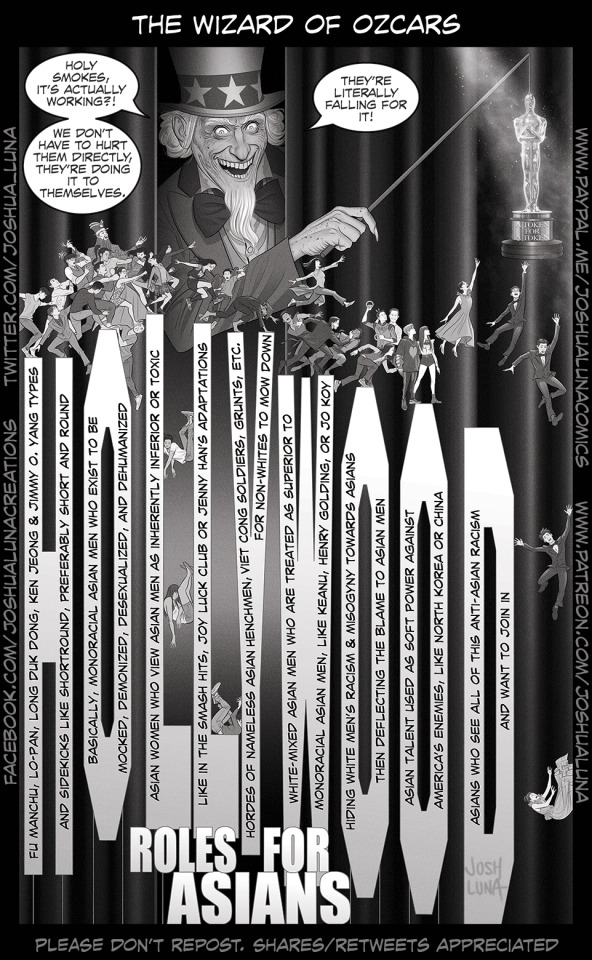
The US and its propaganda arm, Hollywood, have always been anti-Asian. Although opportunities are opening up for Asian actors, the underlying messaging—that divides and hurts Asians—hasn't changed.
Not too long ago, AsAms seemed united in outrage against racism and white-washed casting such as Scarlet Johannsen in Ghost in the Shell, Tilda Swinton in Dr. Strange, or Netflix’s Deathnote. Yet as more projects with AAPI leads and casts were produced, this so-called unity proved to be a lie.
The illusion of AsAm unity fell apart with To All the Boys I Loved Before—which was widely celebrated despite its blatant white-worship. The most recent blow comes from Hulu's The Company You Keep, a U.S. remake of a k-drama that replaced the male love interest with a white man.
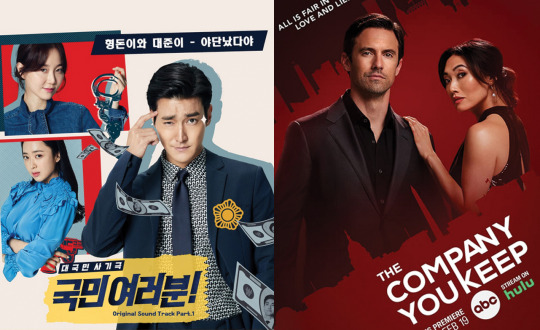
Once it seemed like AAPI women were getting roles and being “humanized” (i.e. garnering attention and approval from white men on-screen and off) AAPI with media power were satisfied. It didn't matter that AAPI men were still erased and dehumanized—even in supposedly pro-AAPI projects.
Not only do AAPI with media power not care about the continuing harm against AAPI men, they exacerbate it. When AsAms critique anti-Asian narratives—especially ones erasing or targeting AsAm men like TATBILB—they're gaslit, harassed, censored and even permanently blacklisted.
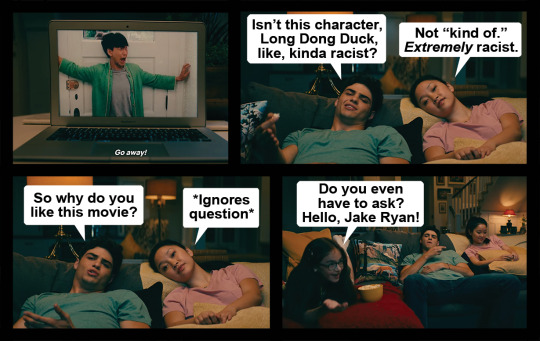
This is because AsAm media is held hostage by the racist framework of the U.S. government's 1942-43 Mixed Marriage Policy. White men's hierarchy—based on perceived threat levels and receptiveness to white assimilation—still dictates Hollywood narratives.
Research confirms that the MMP persists today. A 2015 study shows how gendered racism leads to severe under-representation of Asian men (and Black women). Whereas monoracial Asian men face significant barriers in dating, a 2014 study shows mixed-white Asians get a "bonus effect."
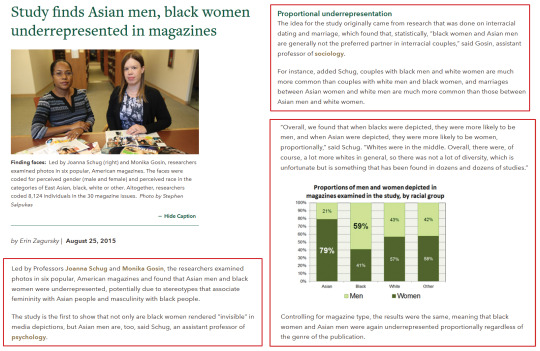
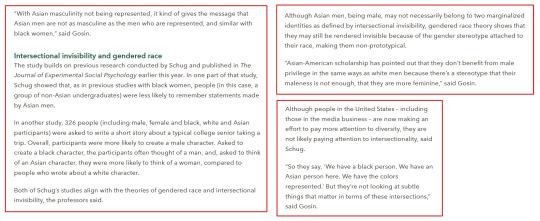
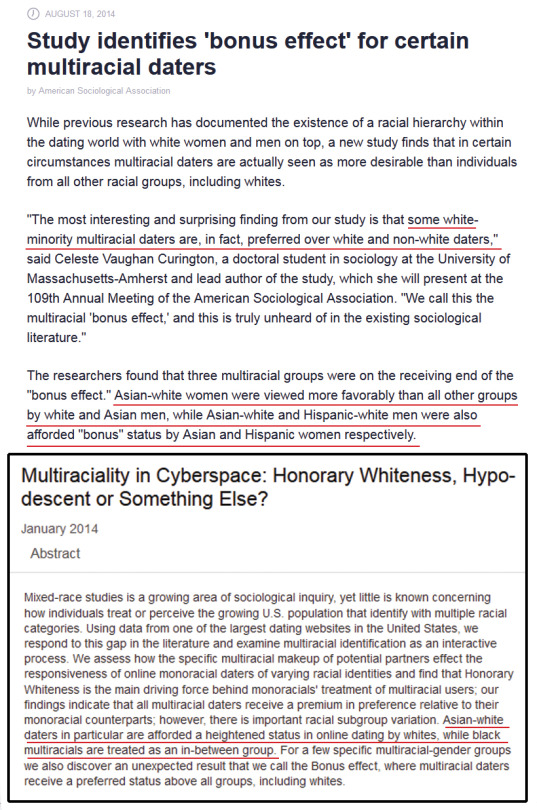
This is why Hollywood execs know there will be less uproar if monoracial Asian men aren't represented—it's been the status quo for decades. In the few roles made for Asian men, they still fall into two categories: pathetic loser or toxic man/villain. In some cases, both.
The hatred and erasure of Asian men is so deeply embedded that it's led to the widespread erasure of AAPI men as victims of anti-Asian hate crimes in recorded stats and media narratives. AAPI journalists know this, yet continue to do nothing to correct it.
So what's next for AsAm representation? In 2022, Janet Yang became president of the Oscars. She's co-founder of Gold House—an AsAm Hollywood collective—and executive producer of Joy Luck Club, a seminal work bashing Asian men as irredeemable misogynists compared to "good" white men.
Many AsAms like Yang want more of Joy Luck Club and similar stories. Amy Tan, author of JLC, has been pushing for years for a sequel with the original cast. A TV series was optioned in 2017, and as of 2022 a movie sequel is to be written by white male screenwriter, Ron Bass.
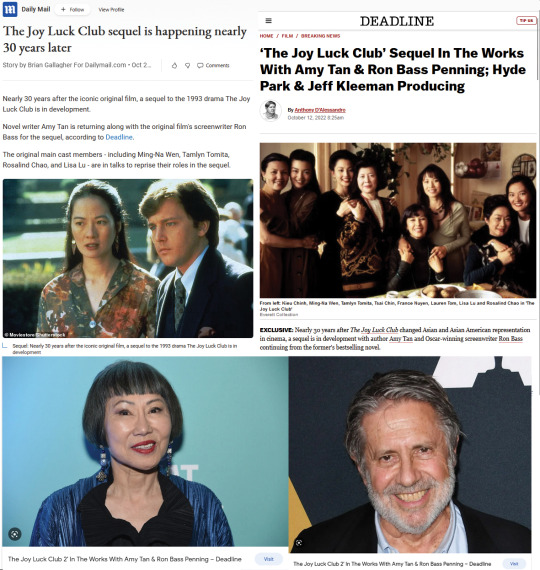
Stories like Joy Luck Club aren't just bad media—they're dangerous. Arthur Martunovich randomly hammered three AsAm men to death because he saw a movie depicting Chinese men as abusers and he wanted to "protect Chinese women". There's a high chance that movie was JLC.
Hollywood has figured out it’s easy to make anti-Asian films and stifle criticism by hiring Asian tokens to give stamps of approval. An article from 1986 (40 years ago) about AsAm criticism of racism in Big Trouble in Little China shows there's a history of sowing division among AAPI and using government resources to do it. I understand the allure of the Hollywood dream because I used to believe in it myself. From an early age, all marginalized groups—POC, women, LGBTQ+—are taught to fantasize about how we'll finally be accepted and heal the hurt once we get on a big stage and give an award speech. Having experience in Hollywood as a comic creator, I know how people in power (esp. white men) behave. Their goal is to wear you down until you internalize their bigoted messaging, regurgitate it yourself, and then thank them for it. They hate the word "no." Awards don't matter if the content that gets you there ultimately serves bigoted and harmful purposes. In 2020, I made a test for AAPI media. None of the projects so far have passed. That's by design. We think we’re holding the statue, but really, it’s holding us.
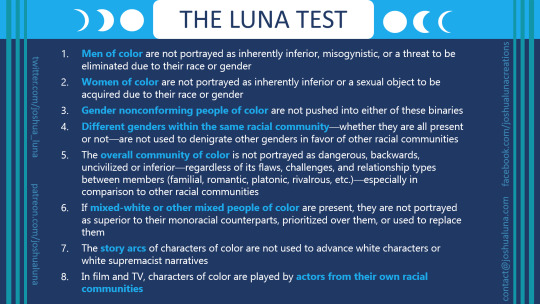
Correction: I just noticed a typo in the comic. Inside the Hollywood sign's letter "Y" I meant to say "non-Asians" not "non-whites." Sorry, it was a lot of drawing and writing, and I got tired 🥴 (Please don’t repost or edit my art. Reblogs are always appreciated.)
If you enjoy my comics, please pledge to my Patreon or donate to my Paypal.
https://twitter.com/Joshua_Luna/status/1134522555744866304 https://patreon.com/joshualuna https://www.paypal.com/paypalme2/JoshuaLunaComics
#asians in hollywood#aapi in hollywood#asian representation#aapi representation#oscars#academy awards#racism#anti-asian racism#gendered racism#hate crimes#anti-asian hate crimes#media analysis#asian americans#fil am artist#my art#artists on tumblr#joshua luna#josh luna
105 notes
·
View notes
Text
can't find it rn but I'm thinking about that post that was going around recently that pointed out that claiming anime is uniquely sexist or sexual and attributing that to japanese culture is racist as hell. that post is correct -- this isn't to dispute that but to add onto it -- and I think a part of that perception is how "anime" has been shaped into this weird consumer category by corporations, where it gets treated more like a genre than a medium (animation) of a particular style and context.
what comes to mind when we think of "anime" in the english-speaking world largely depends on what shows get licensed, translated, dubbed, and merchandised outside of japan. fan translations and bootlegs have always existed, but sanctioned releases from large companies bring larger audiences, so companies dictate to a certain extent what gets popular, and therefore the popular perception of "anime" as a category.
a lot of cool and unique things make their way over here, but do you know what a lot of it is? shounen. light novel adaptations about increasingly specific male power fantasies. action series. a lot of it is stuff made with teenage boys as the target demographic in mind. again, a lot of other anime exist, but when you think of the "blockbuster" series every season, it definitely skews more towards one gender.
if my exposure to american media was mostly limited to its most juvenile action movies and the lobbies of popular online shooters, I would also conclude that america is uniquely horny and has an issue with women. the only difference between america and japan in this respect is that, for whatever reason, the U.S. has largely relegated mainstream 2D animation to the kids' table outside of specific adult cartoons. there just really isn't a good american equivalent to the kind of shows people are most likely to think of when they think of "anime"
like this doesn't mean that popular anime don't have these issues with them -- you can (and should) critique media no matter where they come from. it also doesn't mean that attitudes and beliefs don't vary between countries and cultures. but the instinct to attribute the issues with (your idea of) anime to the country it came from first rather than considering the target audience of the specific show you're watching and comparing it to similar media in other parts of the world is definitely rooted in racism
you are sitting on your laptop watching the shounen anime du jour and thinking "wow, this is a country with no respect for women" while your younger brother is in the other room running over hookers in gta. maybe broaden your perspective of the issue beyond national borders
#sorry if this is incoherent it's 2AM and i'm trying to articulate a Thought#like the american anime licensing industry#is just the maturation of the bootleg anime fandom of the early internet#and most of it is made up of nerd boys and men#this isn't a value judgement just an observation#and these people decide what media to dedicate their resources to sharing more widely#and so the anime that's available inevitable reflects their tastes to a certain extent#very niche example but i remember being big into anime yt circles when sgrs was released#and it's a really good show and it was rightfully praised and recommended by the type of people who watch most seasonal anime#but it was always with the caveat (said either explicitly or implied) that it was good *for a show marketed to adult women*#like 'oh it's not what you think it's really good'#because female fans are expected to watch a lot of 'classics' and look past any questionable content#but shows for women have just a few series that get a stamp of approval for being 'not too girly that men can't enjoy'#as if that's the ultimate mark of quality#we should start gatekeeping male anime fans and tell them they're not real fans if they didn't watch [some random shoujo]#reilly.txt#making non-rebloggable just bc i'm not sure if this will end up in any searched tags and don't want randos#i'm open to discussion and criticisms but like... smaller circle than that lol#long post
8 notes
·
View notes
Text
Chapter 2: You Should Dive Right In
Pairing: Din Djarin x F!Reader
Summary: A shopping trip. A quiet moment. A gift. A fine day.
Word Count: 1.2k
Warnings: T, not much going on in this but some good old fashioned yearning. While this story is not explicit, my blog and the content shared on it is 18+ MINORS DNI.
Cross-posted on AO3
A Sweet Response to Tragedy Masterlist || I Think of You Series Masterlist
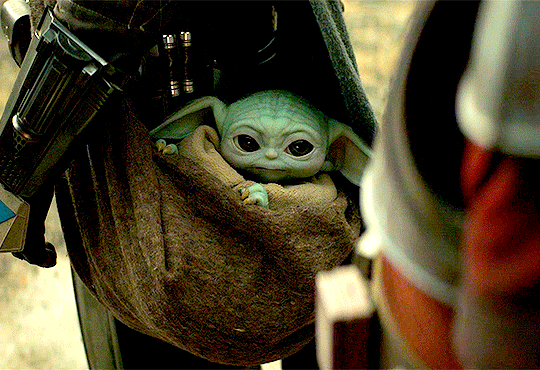
The return to the loud street clears your head and returns you to the tasks at hand. The vendors lined up on either side entice you with bright cloth, round ripe fruits and intrusive shopkeeps peddling their wares. Slowly walking back the way you came, you start the annoying process of haggling with every shopkeep. It’s the pleasant non-threatening haggling most women need to do, hemming and hawing about cost as you wait for the owner to succumb to a price reduction so he feels like he’s helping you out. The women owners are easier; a few quick words and most offers are agreeable.
Enough people are meandering in the street that you can pass relatively unnoticed, approaching and retreating quietly with your credits. The child is noisier, but his vocalizations are mostly lost in the babble of women gossiping, men shouting good-natured jeers, and children weaving between stands and legs. It’s a stark difference from the Crest, but one you’ll only enjoy in this short spurt before returning to quiet and safety.
(returning home)
You procure your own set of toiletries (thank the Maker) more suitable to what you had at home. Your own toothbrush, which makes you giddier than you expected. Towels, pillows and a cushy bed pad you plan to put in your new sleeping space tonight. A few blankets of varying weights, even though the general temperature in the Crest is cold.
The child is enjoying the excitement from hip level as you show him items and follow his eyes to others. There’s a bright blue baby blanket of incredible softness, white stitching making patterns like the striations of desert stone. You think of the little hammock and how cozy he’d be tucked in with this.
“Hey Bean, what do you think?” you ask, holding it down for his inspection. He touches it gently with his hand and coos, followed by a giggle. “Sounds like a stamp of approval.”
Then comes the tedious part - replacing your entire wardrobe. You’d already finished stocking up on rations (only picking the best kinds, no more strange gloppy messes that you all choke down in disgust) and actual food, choosing bags of grain and dried vegetables, preserved meats and fish that you know will keep well. You discovered a portable nanowave stove rummaging through a storage closet on the Crest, and maybe in a few planets you could convince Mando to get a bread oven.
(if you’re still with this duo in a few planets)
You’re running your hands through racks of clothing as your mind drifts. You know the life you’re living now is precarious, your safety net now numbers on a datapad. You’re at the whim of Mando’s work and the dangers it may bring. At any time he might decide it’s better for you to go home.
(even though there is no home to go back to)
If only you could show them how much you want to be there, providing for them, giving them the things they don’t have. Food and entertainment and companionship (and your body, if Mando still wanted it). Placing yourself within their hearts as much as you feel them settling into yours. Maybe that could be enough.
The child coos and you hear the strange baby concern you’re convinced is your own projection. Looking down you see his triangle-shaped head staring up at you, ears slightly downturned.
(do you really look morose enough to warrant the big baby eyes?)
You smile and rub the ridge of his ear, a quiet moment hidden in the aisles of the shop.
“I’m okay Bean, I promise. It’s just been a…unexpectedly emotional day,” you assure him. His little hands reach up to you, and it makes your heart pound.
(you’ll never stop being surprised that he wants you)
Lifting the child out of the bag, you perch him in your elbow, his chubby cheek only inches from yours. You smile softly at him as his eyes roam your face (does he know what his father looks like?) before he snuggles his own in the soft curve of your shoulder.
“Oh sweet baby,” you murmur, stroking his back. “Don’t worry, I’m not going anywhere.”
You let him stay curled in your chest as you multitask flipping through the clothes. Avoiding lingering was an instinct born out of Mando’s constant warnings.
(be aware of your surroundings)
(don’t stay too long)
(call me if you run into trouble)
You’d wished you could audibly roll your eyes listening to his diatribe, but you did get a small communicator out of it. The metal loops behind your ear, hidden by your hair, and makes you feel connected to Mando even when he’s well out of reach.
(now if you could only feel this way when he’s close enough to touch)
The child helps you with your final selection: a week’s worth of clothing, complete with underthings, sleep clothes and layers for the cold of hyperspace. You even find a few sturdy pairs of boots that should make traipsing around foreign planets much more comfortable.
As you’re finishing the negotiation with the female Twi’lek shopkeep, the child makes a “bah!��� and points at something hanging behind you.
You turn and see a rack of men’s clothing, simple solid colors. The child looks at you and waves his hand.
“Your dad said he didn’t want anything, bean,” you say, but he grunts in that insistent baby way.
“If you’re set on the price I’ll throw in a couple of those, no extra cost,” the shopkeep says. Her smile at the child is fond, looking at the two of you with a softness you recognize.
(you’re not his mother)
(but you don’t mind her thinking that)
You ponder the offer for a moment, hoping you’re not overstepping, but decide to get two soft black t-shirts. Maybe Mando could use a break from the duraweave every now and then. You guess at his size, lingering for a moment on the memory of being in his arms, the thickness of his bicep under your hand.
(if he hates them, the more clothing for you)
You add the bundle to the hover-carrier you rented, now stacked with all of your purchases. The child is chirping at a hot food stand, so you get him a few sticks of things that you think were animals before they were barbecued to a crisp. The crunches coming from the pouch are gruesome, but he’s enjoying the heck out of himself so you’ll bear it. You settle on a sandwich wrapped in waxed paper, savory meat and cold vegetables sopping into chewy bread. It’s easy to eat one-handed as you make your way out of the market.
A small chime sounds by your ear, and you juggle your meal to hit the transmit button.
“Mando?” you ask, swallowing around the bite of food you’d just taken.
“Are you and the kid done?”
“Yeah, heading back now. Got everything we needed.”
“Good, I’ll meet you on the way.”
Your heart flips, now wishing you didn’t smell like burnt meat and grease. You hastily finish your meal and hurry to the edge of town. (maybe you’ll still get a little time to enjoy the day)

PREVIOUS || NEXT
#din djarin x f!reader#din djarin x female reader#din djarin x you#din djarin x reader#din djarin#mando/reader#mando/you#mando/f!reader#the mandalorian fic#mandalorian fanfic#mandalorian fic#the mandalorian#the mandalorian x f!reader#the mandalorian x female reader#the mandalorian x reader#i think of you series#prolix fics
153 notes
·
View notes
Text
Out of Time [5]: Steve x Reader
Series Masterlist with dates on chapter releases - tag list will not be used for this series
Summary: After Steve gets injected with a mysterious substance during a mission gone wrong, you come to find out that the only thing that can save his life is a pure sample of Dr. Erskine’s Super Soldier Serum. Unwilling to let the love of your life die without a fighting chance, you travel through the quantum realm back to 1943. Equipped with little more than your knowledge of past events, you have to figure out just how exactly you’re going to get your hands on that serum. Not only that, but with the infinity stones no longer protecting the reality you’ve come from, there is now a chance that your presence in the past can change the future you’ll return to. Can you succeed without messing things up? And if things go wrong, can you fix it before it’s too late? Or will you run out of time…
Word Count: 4719
Warnings: none
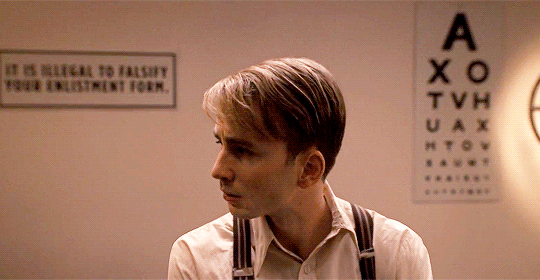
The next few days seem to pass in a frenzy and before you know it, it’s already Saturday. Steve had asked you in the morning if you wanted to catch a movie with him later and it nearly killed you to have to refuse him. It was hard to miss the look of longing that had developed in his gaze whenever he looked at you ever since the two of you shared that dance. You felt that very same longing down to your very soul.
You would give just about anything to be able to stay here, living in a bubble of bliss. To protect him from all the horrors you know he will face if he fulfills his destiny. But you know you can’t do that. In fact, you have to do quite the opposite. You have to do everything in your power to make sure that it all still happens.
So, you’d started dropping little hints here and there. Trying to encourage him to try for recruitment again. Talking about the war effort and how bad they needed more soldiers. Groaning about how none of the people showing up at the recruitment center are a good fit for the program you work for. You make sure to get it into his head that fighting in the war isn’t about killing the most people in order to win, it’s about stopping bad people from doing even worse things.
By the time you’re walking into the Recruitment Center Saturday morning, all that’s left to do is hang onto that faith like you’re always telling Dr. Erskine. You have to believe that things are going to go right, otherwise, you’re not sure what you’re going to do.
The center is a madhouse all day long, which certainly helps to keep you distracted. The Fair has brought droves of people into the area. Dr. Erskine gives you a pat on the shoulder in passing between interviews and comments that this had been a pretty good idea. You certainly were seeing new faces today. Some good, most… not quite. There were several groups of men coming in with their friends, rowdy from the alcohol provided at the Fair, and boasting about how they were going to be the guy to win the war. Those ones tended to be a little handsy. You may have accidentally broken a few fingers.
When Erskine caught onto what was happening, he’d sent you out to run a perimeter check to give you some space. At that point, night had already fallen. The Fair looked even more magnificent under the cover of night. The buildings were lit up like Christmas trees and they had fireworks going off in the distance.
“Excuse me, Miss?” you hear a familiar voice and turn to see one Sgt. James Barnes dressed to the nines in his military uniform. “I’m looking for my friend, Steve. He was just with us at the Stark show but then disappeared. He’s blonde, kinda thin, always walks around with his head down. Have you seen him by any chance?”
You have to calm the pounding of your heart before you can respond. “Um, yes… I think I saw him heading toward the Recruitment Center,” you tell Bucky. Even though you hadn’t actually seen him, you know that’s where he must be.
Bucky frowns, sighing in irritation. “That little punk,” he mutters under his breath. You’re pretty sure you weren’t supposed to hear that and have to refrain from smirking. “Uh, thank you,” he nods, backing away and heads in the direction of the center, the two women with him following behind.
It takes everything in you not to go rushing over there yourself to make sure things are going according to plan. You have to make sure your presence can’t interfere with Dr. Erskine seeing Steve for the first time. You complete a full lap around the Fair, hoping that will have killed enough time before you start to make your way back.
You watch a figure heading your way and come to a stop.
“This is me not sneaking up on you,” Howard proclaims, hands raised in innocence.
“Mr. Stark,” you greet, smiling in amusement. “How was your show? Did you blow them out of the water?” you ask, using his turn of phrase against him.
“Well, something certainly blew,” he laughs good-naturedly. “I take it, you saw what happened?”
You shake your head, “No, but I’ve certainly heard all about it.”
“News travels fast.”
“I happen to be in a unique position where knowing exactly what happens, and when, can mean a matter of life or death,” you tell him frankly.
“Well, then I guess I better let you get back to work. Maybe we can get drinks sometime when death is no longer on the table,” he grins.
“Have a good evening, Mr. Stark,” you dismiss, beginning to step around him to continue on your way.
“Vic?” You look up to catch Steve coming out of the Recruitment Center. His gaze flickers over your shoulder to watch the man you’d just been speaking with walk away. “You know Howard Stark?”
You walk up to him, shrugging your shoulders casually. “He’s more of an acquaintance,” you explain. More like an annoyance.
“I just…” his brow furrows and he frowns. “I don’t understand what you’d be doing, hanging around a guy like me when you know a man like that.”
“Steve,” you step up to him, placing your hands on his shoulders. It doesn’t escape your notice how he’d referred to himself as just a guy, but Howard as a man. “I love that you don’t have an ego the size of Texas, like most men in this world, but you really need to start giving yourself more credit.”
He smiles wryly. “I’ll try and work on that. This certainly helps,” he lifts up a brown folder that he carries and hands it to you.
You open it to find his enlistment papers. It’s stamped with 1A on the bottom and has Dr. Erskine’s signature for approval. The relief you feel is so immense you could just about collapse right now. “Steve, that’s amazing!” you tell him, sharing his excitement.
“I ship out to Camp Lehigh tomorrow morning.”
You close the folder and hand it back to him, “Well, then. I guess I’ll see you there,” you grin.
“You will?” he questions in surprise.
“I told you that I was only in New York for the week. Wherever Dr. Erskine goes, I go.”
Steve feels a strange sense of relief knowing that he’ll still get to be around you, and this isn’t goodbye, just yet. “Do you really think I’ve got a shot at this? You said you were looking for soldiers with a specific skillset. Why would Dr. Erskine choose me?”
“Because of this,” you tap a finger against his temple. “And because of this,” you drop your hand to tap at his chest. “Anyone can pick up a gun and follow orders. You have to be more than that. This isn’t about strength or bravery. This is about knowing the value of a life before you decide to take it. I’m not saying that this next week is going to be easy for you. In fact, it’s probably going to be very difficult. But you have to show them that you’re more than the sum of your parts. I know you can do this, Steve. You’re destined for greatness.”
You catch the way his eyes dip to your lips but barely have enough time for that to register before he’s leaning in and pressing his lips to yours. Not expecting him to do that, you stiffen up from the shock. Steve reacts almost immediately, pulling back with a panicked look on his face. “I’m so sorry. I thought-”
You grab his face in both of your hands and smash your lips back onto his. You kiss him long and slow, just the way you know he likes it. You can feel his inexperience in the way he’s slow to respond. He nearly drops the folder in his hands, remembering at the last second to grip it tighter with one hand as the other falls to your hip. Your tongue darts out to lick tentatively at his plump lower lip. He tastes salty, like popcorn from the fair. You feel his entire body shiver when your tongue swipes against his lips again.
His heart feels like it’s going to beat right out of his chest and he’s getting dizzy from lack of oxygen, but he doesn’t want this to stop. You make the decision for him, when you pull back, your nose brushing tenderly against his. He has to blink several times as the haze clears from his mind before he meets your hooded gaze. “Wow…” he breathes. “I- that was… wow.”
You can’t help but giggle at how adorable he is. “Right back at ‘cha,” you wink.
His lips split into a dopey grin. He knows that he must look like an idiot, but he’s past the point of caring. “How much longer do you have to stay?” he asks.
You look down at your watch. “Maybe another hour or so.”
“I can wait if you want to go home together?” he asks, hope shining in his eyes.
Your gaze softens, “I’d like that. Why don’t you finish checking out the Fair and then meet me back here?”
“Okay,” he agrees, eyes flickering down to your lips once more.
Unable to help yourself, you lean in for another kiss. He kisses back a little more fervently. When you pull back, you have to physically distance yourself by stepping away from him, otherwise, you’d never let him leave. “See you in an hour,” you smile.
“Yeah,” he nods once, walking backward a few steps before turning to head back to the Fair exhibits. For the first time, he walks with his shoulders back and his head held high. There’s almost even a bounce to his steps. He glances once over his shoulder and grins when he sees that you’re still watching him.
“So, that is the one, huh?”
You start at the sound of Dr. Erskine’s voice, not having heard him walking up to you. “Hmmm?” you question, unsure if he’s asking whether you think Steve is the one for Project Rebirth, or what exactly.
He grins and gives you a knowing look. “The man capable of holding your interest. You have good taste.”
You laugh nervously, your blood heating in embarrassment. “Didn’t I say you might meet him one day?”
He chuckles. “Yes, well. It would have saved me quite a few gray hairs if you had brought him over a lot sooner.”
You grin widely at that. “Sorry, Doctor,” you apologize with a light laugh. “But it needed to be his own decision to come. He wouldn’t have accepted if he thought the offer had been handed to him because of me.”
“I can understand that,” he nods along to your words. “Well, why don’t you take the rest of the evening off and go enjoy the fair with your man?”
You look up at him in surprise. “Really?”
He smiles fondly down at you. “You won’t have much time to spend with him once we’re at the base. And I can now rest easy, knowing there is a candidate that I can truly put my faith in.”
“I thought scientists didn’t believe in faith.”
He shrugs his shoulders. “This one may have changed his mind.”
You smile victoriously.
“Just make sure he’s not late for the bus tomorrow morning. You and I can head for Camp Lehigh afterward.”
“Of course,” you nod.
“Enjoy your evening, Vic,” he dismisses you, beginning to turn back toward the Recruitment center.
“Thank you, Doctor,” you call after him.
He waves you off before you turn and excitedly hurry toward the direction Steve disappeared to. It takes a minute to find him in the large crowd. It’s definitely not as easy to spot him without those broad shoulders. Eventually, you catch sight of his blonde head of hair and make your way over. You approach him from behind and loop your arm through his.
His head swings over to you, surprise lining his features until his eyes meet yours. “Hey!” he greets you with a toothy grin.
“Erskine gave me the rest of the night off,” you grin back.
“Oh, well do you want to head home now, then?”
You shake your head, still smiling. “No. I want to see the Fair and share a bag of popcorn with my best guy.”
Steve starts to look around. “Well, is he meeting us here, or…” he pretends not to know who you’re talking about.
“Steve!” you laugh and slap his shoulder.
He laughs too. His eyes flicker all over your face and you can almost feel their caress. “I’ve never been anyone’s best guy before.”
“Would a kiss help to convince you?”
“It might.”
You happily lean in until your lips are pressed to his. You keep this one sweet, but short, not wanting to cause a scene that might embarrass you both. “How about now?” you ask, tilting your head to rest your forehead against his.
“I think I’m getting there.” His words tickle your cheeks.
You laugh, pulling back. With your arm still linked through his, you tug Steve toward the closest popcorn stand. He holds the bag while you happily munch on the salty snack and look around at the exhibits. You find it absolutely hilarious how dated all of these latest and greatest inventions all are. It’s almost difficult to keep it to yourself.
You’re highly amused and thoroughly enjoying yourself, but your internal commentary is far more entertaining than the actual exhibits. Mostly, you’re just enjoying what little time you have left with Steve. As the crowds begin to thin out and the night air starts to grow colder, you and Steve decide that it’s time to head back home.
The two of you walk through the door hand in hand. You feel lighter than air and you’re just so happy that you can now kiss him whenever you want. And you did. Multiple times on the journey home. The blissed-out expression hasn’t left his face all night and it just makes you want to kiss him even more. The way your heart pounds in your chest makes this feel like new love, even though you’ve been in love with him for years.
You’re barely able to let go of each other long enough to get ready for bed. And even once you are both tucked away for the night, you’re more wrapped up in each other than in the blankets. You pull out of, yet another, lengthy lip-lock. He’s getting better with each one, picking up on your cues and responding in kind. It makes you feel like a teenager all over again. Making out with your boyfriend in the dark. Getting drunk and giggly off of his kisses. Steve is breathless by the end of every one, but like a champ, he keeps coming back for more.
“We should sleep,” you whisper, trying to be the voice of reason. “You need to be at the bus station bright and early and you still need to pack.”
“Just one more,” he insists, leaning forward and stealing your lips back. You can’t protest and he damn well knows it. With your hand at the back of his neck, your nails scratch at the shorter hairs right at his nape. His own hand presses against the middle of your back, pushing your body even closer to his. You can feel his arousal against your lower abdomen, but he doesn’t act on it. If you thought he was ready for it, you’d try to get him to, but for now, you’re content with just kissing him.
You pull back once again. While he catches his breath, you duck your head down, tucking it beneath his chin and bury your face into his chest. “Okay, now we’re really going to sleep,” you urge, safely tucked out of reach.
“Fine,” he sighs stubbornly, tilting his head to rest his cheek against your hair.
You laugh and your breath causes his skin to tingle. “Good night, Steve.”
You can hear the smile in his voice as he responds. “Sweet dreams, Vic.”
A content hum leaves your throat as your muscles begin to relax. “Who needs sweet dreams when this is so much better?”
For the first time in a long time, Steve falls asleep with a smile on his face.
-
The two of you pack up together when morning comes. You’ve slipped back into your military uniform and have taken the dark green dress coat out of your suitcase to help cover the mended bullet holes in your shirt and to make room for you to pack away your toiletry bag and first aid kit.
You look around Steve’s bedroom to make sure you’ve got everything. The glint of metal catches your eye from the top of the dresser inside the closet. Stepping closer, you find that it’s the pistol you took from those Hydra agents at the beginning of the week. God, that feels like a lifetime ago. Glancing around to make sure you’re still alone, you grab the gun and take it to your suitcase. It may come in handy later. You pull out the magazine and check the chamber before tucking the gun away and closing up the suitcase.
Lifting it by the handle, you walk out of Steve’s room. You pause as you enter the living room, smiling at the sight before you. Steve is sitting cross-legged on the floor next to his bookshelf. His suitcase is only half-filled with clothing and he’s packing books into the other half.
“You’re probably going to be the only person showing up with books in their suitcase,” you laugh lightly.
He looks up from the two books he has in either hand and grins. “You’re the one that said I should stand out.” He puts one book into the case and places the other back on the shelf.
“Valid point.” You move to set your suitcase down by the front door. “You almost ready?”
“Almost.” He reaches up to grab a picture frame that sits on top of the bookshelf, next to the radio.
“Is that your parents?” you ask, looking at the black and white photo over his shoulder. It shows a pretty blonde woman and a man dressed in a World War I uniform.
“Yeah. They took this the day he shipped out. Ma was already pregnant with me, but didn’t know it, yet.” Turning the frame around, he unlatches the back door and pulls the photo out. He tucks it for safekeeping under the hardcover of one of his books before placing the empty frame back on the shelf.
He pulls the trunk closed and flips the latches to lock it shut. He then pushes up onto his feet with a small grunt. “Well, I guess I’m as ready as I can get. I still kind of feel like I’m not completely sure what I’m getting myself into.”
You can’t help but laugh at that. “Just think of this as your next adventure.”
You each carry your own suitcases out of the apartment and Steve turns around to lock the front door. You take one last look at the place. If everything goes according to plan, you’ll never end up back here. It’s a bittersweet feeling. You may have only stayed here for a week, but it was long enough to make this place feel like a home to you. You’re going to cherish the memories that were created here.
“Shall we?” Steve asks after making sure that the door is securely locked.
“We shall,” you nod, taking his hand in yours and carrying your suitcase with the other. The two of you walk down the steps and out onto the street, hailing a taxi next. The driver pulls over and steps out to help you place your bags into the trunk of the car. Steve holds the door open for you to take a seat in the back before sliding in after you.
He gives the driver instructions to take you both to the bus depot where he’s been told to report. As the taxi takes off, you notice the way Steve’s leg bounces up and down. You’re not sure if it’s from nerves or because he’s excited. It may be a little of both. Reaching over, you take his hand back into yours, threading your fingers between his.
He turns away from the window to meet your gaze, smiling softly when he sees you looking tenderly back at him. He lifts your entwined hands up and presses a kiss to your knuckles.
The taxi soon pulls up to the front of the bus depot. At the back of the turn-about area, you can see that the bus destined for Camp Lehigh is already waiting, a line of men stand out front getting their bags loaded into the side of the bus before boarding. You step out of the taxi from your side and help Steve pull his case from the back. He sets it down on the edge of the sidewalk before turning back to you.
“I’ll see you there, Soldier,” you tell him, placing a chaste kiss to his lips.
“Don’t go easy on me, okay?” he requests.
You smirk openly, “It’s not me you need to worry about.” A picture of Colonel Phillips comes to mind.
He scoffs out a laugh. “Well, don’t tell anyone to go easy on me.”
“I wouldn’t dream of it,” you grin, amused by his request. He never likes having things handed to him. “Good luck.”
He grins wide, lifting his suitcase and taking a step back. “I don’t need luck. I’ve got Lady Victory on my side.”
Your heart stops as you’re overwhelmed with a sense of déjà vu. You’ve heard him say that before. Multiple times. It was basically his default response whenever anyone told him ‘good luck’ during missions. He’d say it with that same cheeky grin and that twinkle in his eyes.
It had to be a coincidence. Right?
Steve is already out of earshot by the time your mind restarts and your default response comes tumbling out. “Love you too, Cap.”
Your heart clenches as your mind begins to race. Is there a deeper meaning here? Something that you’re missing, maybe?
“Where to, Miss?” the taxi driver pulls you out of your thoughts, eager to keep things moving.
“Right…” you pull your focus and get back into the vehicle. You give him the address to Dr. Erskine’s apartment in Queens. The doctor told you to meet him there before an SSR designated driver would show up to take you both to Camp Lehigh.
You watch Steve’s figure through the car window until the taxi pulls out, your mind still racing. It had to just be a coincidence, you surmise and try to push the thought from your mind.
-
You spend the drive down with Dr. Erskine going over the testing rubric for the recruits. It’s heavily weighted toward the strength side of the spectrum and it makes you wonder just how exactly Steve manages to pull this off. Your Steve never really mentioned much about what actually happened at Camp Lehigh. All he said was that it had been a grueling and intense week of testing and training that his body definitely hadn’t been prepared for. And yet, it also ended up being the best thing that ever happened to him.
As the car pulls onto the base, it drives past all the soldiers marching in formation and standing at attention out on the main field. The driver eventually comes to a stop right outside the officer quarters. You step out of the car on your side and walk around the back to re-join Dr. Erskine. The two of you look over toward the front door of the building where Colonel Phillips is now stepping out.
“Doctor, welcome back.” He greets stepping up to you both and shaking Erskine’s hand. “Who’s this?” he questions, giving you a brief side glance.
“Agent V, sir,” you introduce yourself with a salute.
“She’s my personal assistant,” Erskine explains.
“Since when do you have a personal assistant?”
Erskine gives him a hard look. “Since you gave me only a week to find a candidate.”
Colonel Phillips releases a sigh, “Yeah, I saw them come in. I’m pretty sure I know which one you picked.” He places his hands on his hips and stares you down. “Agent “V”, huh. That short for something?”
You stare back, unflinching. “Victory, sir.”
“Oh boy,” he rolls his eyes. “That sounds like some sorta BS that New York Senator would cook up.”
You have to bite your tongue to keep in the snark.
“Lieutenant, please escort Agent V to her quarters. She’ll be bunking with Agent Carter,” Colonel Phillips orders a passing soldier before turning back to Erskine. “You and I are going to talk about these candidates.”
You turn to find that your driver has already pulled your suitcase from the back of the car for you. You give him your thanks as you take it and then follow the Lieutenant inside. The soldier leads you to a door at the very end of the hall, to the left. You knock once on the door.
“Come in,” you hear from inside.
Turning the knob, you push open the door and step inside. The room looks similar to a college dorm. Two matching twin-sized beds, two matching desks, two sets of drawers. There’s a door immediately to the right, which you assume is the bathroom.
Peggy sits at the desk closest to the door, various papers spread across its surface. “Can I help you?” she asks, pushing her chair out to stand.
“I’m Agent V,” you introduce yourself. “I’m here as Dr. Erskine’s assistant. Colonel Phillips instructed me to stay here.”
“A pleasure to meet you, I’m Agent Carter.” She reaches her hand out to greet you.
You have to bite the inside of your cheek to keep from smiling like an absolute idiot. You never dreamed you’d get to meet this woman. She was an absolute legend amongst female SHIELD Agents.
“God knows we could certainly use another woman around here,” Peggy smiles, gesturing for you to come further into the room. “Sheets for your bed should be in the top drawer to the right. Make yourself at home.”
“Thank you,” you smile kindly. You glance at the paperwork on her desk as you pass by before you set your suitcase down next to your bed. “Are you looking over the reports for the new recruits?”
“Yes,” she stands next to the desk and brushes her fingers over the papers. “Colonel Phillips has made it clear that we are picking our subject from this group. We won’t see the men until tomorrow morning, but just based on their recruitment reports, it’s obvious there’s one that doesn’t seem to belong with the rest.”
You can’t help but chuckle under your breath. “You’re talking about Steve Rogers, aren’t you?” Peggy looks up from the paperwork to meet your gaze. “Dr. Erskine picked Rogers out himself.”
She nods, “I saw the signature of approval, I just can’t figure out why.”
You grin widely, “I think you’ll know by the end of the week.”
She finds herself matching your smile. “Well, now I’m intrigued.”
You laugh briefly and turn to get your suitcase unpacked and your bed made. Steve had once told you that the romance portrayed between himself and Agent Carter had been purely propaganda for the media. Sure, he’d respected the hell out of her, but he only ever saw her as a friend. And supposedly, the feelings had been mutual, so you had no reason to feel threatened by her presence.
“Where are the recruits now?” you ask while stuffing your pillow into a white cotton pillowcase.
“Getting fitted for their uniforms and having their dog tags stamped out. After that, they’ll spend the next several hours filling out paperwork.”
You release a low hum, “Lucky them.”
Part 6
476 notes
·
View notes
Text
ALL YOU NEED TO CONSIDER BEFORE BUYING A PROPERTY
Let’s say, you spotted this property ad in the newspaper and were super impressed with it. You immediately went over to take a look at the property, and now, you really want to buy it. The first question that pops in your head is, ‘Can I afford it?’ And the answer to that question is never binary and requires a lot of analysis. For someone who is not so keen on the real estate market and news, all of this can seem extremely new and daunting. That’s why we decided on helping you with a detailed analysis of all you need to consider before buying a property. Read on!
Key Takeaways:
Understanding how much you can afford, and then planning your budget accordingly is crucial for home buying and running your daily life.
An insight into the present real estate market and an understanding of the near future based on the forecast is an important evaluation to make.
While the property to buy and its price are on the table, it’s necessary that you also assess other financial implications and lifestyle changes that are bound to occur and include them in the plan.
1.How to plan your budgeting?
For an investment as huge as buying a house, planning your finances is the biggest worry. But with a clear understanding of your present lifestyle, incurring expenses and savings, you will be able to analyse how much you can afford, and that could be of great help with planning your budget. Here are a few things to keep tabs on:
Debt to Income Ratio:
If you have adequate cash to purchase a house, then there’s no stopping you from buying it if all the papers are clear. If not, which is often the case, don’t worry. We have housing loans. One of the foremost requirements for availing a housing loan is getting the loan request approved. What eases this process is a standard called debt to income (DTI) ratio, which is what the banks, lenders and other financial institutions use to determine one’s repaying capacity. By definition, it is the ratio of the monthly debt payments to the gross monthly income (without tax deductions) of the borrower.
The lower your DTI, the better chances you have for getting your loan approved. This is because your DTI is proof enough that you have a perfect balance between your payout obligations and income. Here’s what your DTI means to your lenders and what you can do about it:
DTI
How lenders see you
What steps you can take
Below 35%Favourable candidateGet your loan approved and buy the house.
36% – 49%A candidate who is often considered. One with a lower DTI is preferable as they can better handle unforeseen expenses that may come their way.
Making a larger down payment
Reducing your DTI by paying off extra for existing loans to reduce overall debts.
Having a high credit score by settling your credit card dues on/before time to increase trustworthiness.
Talk at your workplace to initiate your pay hike earlier to reduce DTI.
Above 49%A risky candidate whose application is often rejected.
Move your purchase a few months down the year by talking to the property owner asking for more time.
Simultaneously, reduce your DTI by negotiating a salary hike at work or by covering present debts with higher EMIs.
Avoid acquiring new loans in this period.
Calculate your DTI every month to check for a drop.
Let us take you through an example to make this simple to understand:
Rajesh is on the lookout for a new house for himself. But presently, he has an ongoing personal and a car loan (in the closing stage) and is paying ₹8,000 and ₹25,000 as EMIs. Before heading to banks and lenders, he wants to understand if he could avail a loan and calculates his debt to income ratio. His total EMI is ₹33,000 (personal loan EMI + car loan EMI), and his gross monthly salary without tax and charges comes up to ₹80,000. Now, Rajesh’s debt to income ratio expressed in percentage comes up to 41.25% (total EMI ÷ monthly salary). Since his DTI falls under the range of 36% to 49%, he has a good chance of getting the loan if his credit card statements are clean, and he has a lump sum in his savings for making a huge down payment.
Down payment:
Let’s talk about the elephant in the room that one cannot ignore while purchasing a house. A down payment is the upfront payment or deposit that you need to make at the early stages of buying, to block a property. By making a large down payment, you waive yourself off a huge amount of money that you may otherwise have to repay your lender as interest.
In India, to ensure that the borrowers are committed to repaying the lenders and financial institutions, the RBI has set 20% of the property’s purchase price as the minimum down payment amount. This is, however, liable to change based on the age of the property you are purchasing – the older the building, the lesser is the loan sanctioned. This will be purely based on the valuation of the property at that point of time.
Let’s take Rajesh’s example to understand how beneficial down payment can be for repaying home loans. He recently decided on buying a house and came across one that fits all his expectations for ₹70,00,000 (exclusive of registration fees). He has approached a bank for a loan and got the approval. The loan processing fee, rate of interest and tenure are 1% (maximum ₹25,000), 6.5% and 15 years, respectively. Since he has been planning to buy a house for years now, he managed to save about 30 lakhs for the same (including his investments) and is ready to shell out ₹20,00,000 as down payment, which is more than the required 20% of the property price, including the processing fee charges (₹14,00,000 + ₹25,000). With his principal loan amount coming down to ₹50,00,000, his EMI comes up to only ₹43,555, which without the down payment would have been ₹60,678.
Now that you know the importance of down payment, here are a few tips on how you could arrange for the same:
Start planning early so that you can save up and use a huge portion of your savings, leaving enough for emergency needs, monthly personal expenses, loan processing fees, EMIs, associated costs like stamp duty and registration fees, etc.
Turn to your investments. Sell off a few well-performing shares or use your FDs, mutual funds and stocks as security to get a low-interest loan that settles your down payment while also allowing your investments to grow continuously.
Getting a soft loan with very minimal or no interest from relatives, friends or your workplace could be of great help.
Consider the Pradhan Mantri Awas Yojna (PMAY) scheme to get low-interest-rate loans for affordable housing. Since your monthly EMIs are lower in this plan, you can pay the down payment using these funds without arranging for additional funds.
Apply for a personal loan with no collateral by showing your credit score, DTI and other criteria. Keep this as the last resort as it is the costliest means.
Research on all the various banks and loan schemes before zeroing down on one to get the lowest interest rates and avail other benefits like low or no processing fees, offers for first-time and woman buyers, etc. This can reduce the pressure of keeping a huge amount in hand for a down payment.
Planning your EMIs:
If you have decided to loan money, you need to plan your EMIs. Reserve a contingency amount along with the down payment for your first few EMIs to ease you off the burden of worrying about repayments when the time comes. You can also try prepayments to bring down the EMIs further down the tenure, if it doesn’t mean a financial crunch. Apart from these, there are a lot of other options too that you can explore. Some banks offer Flexi Hybrid Home Loan plans that allow you to pay just the interest amount as the EMI for the first few months of the loan period. Now, all banks allow you to transfer your home loan balance from their bank to another if you find the interest rate at theirs too high and burdensome.
2.What’s the real estate market looking like?
Once the money matters are sorted, you need to delve deeper into seeing this as a real estate investment. Being able to just cash off your purchase is not a reason enough for you to buy a house. You need to check if it’s a worthy investment, and for that, you need to understand the real estate market scenario.
Of course, real estate is a safe long term investment plan with so much to offer. But this is subject to change based on recessions and disasters like the most recent pandemic. So, if you are expecting a rise in property value with time, you need to take all of this into account, along with your mortgage repayments, maintenance costs, property development, etc.
The effect of the recent pandemic has eased the financial constraints of buying a house to an extent. Some of the buyer and builder trends that will thrive in 2021 include:
Affordable housing has become the best choice for both consumption and investment. Developers are offering a number of amenities at reasonable prices, and the recent festive season has boosted the demand for this segment. Another factor supporting this trend is the government PMAY scheme that helps buyers with annual incomes ranging from below ₹3 lakhs up to ₹18 lakhs by providing loans with interest subsidy ranging from 3% to 6.5%.
With the new norm of work from home and the series of lockdowns in the past year, buyers have shown interest in larger homes, integrated townships and gated communities. This is because of the need for security and easy access to basic facilities during a time of crisis. So, buyers are looking for properties that promise them a holistic living with all the necessary amenities, all at an affordable price.
The pandemic delayed and halted several construction projects, instilling a sense of fear in the investors and buyers, making ready-to-move homes the preferred choice.
Interest rates in banks have been at an all-time low to attract buyers along with several other offers (women, first-time home buyers) and waive offs (reduction in processing fee, etc.).
The government has also extended its support to boost the real estate industry by giving a 6 – 9 month deadline extension for project completion through RERA (Real Estate Regulation Act) 2016, relaxing tax rules for houses costing up to ₹2 crores to encourage sales, extending interest subsidy for the MIGs (Middle Income Groups), reducing stamp duty charges, etc.
With metro construction underway and commercial & industrial development on the rise, the Chennai suburbs like Porur, Perumbakkam, Poonamallee, Padi, Pallavaram, Shollinganallur, etc., are gaining momentum as residential hubs.
The demand for 2BHK houses followed by 3BHK and then 1BHK, and an increasing interest in plot purchase in areas like Thirumazhisai, Avadi, etc. (for investment purposes) are on a high.
With the high demand to supply ratio, the future seems favourable for you, the buyer. However, with construction and raw material costs increasing, you can expect an increase in property prices too. Based on the above-mentioned trends and the economic outlook, take a call on whether now is the time for you to buy your dream house or not. Right now, the market is slowly getting back to good speed after the huge blow last year. When you know that the price is low, and you’re convinced about striking a good deal, then it probably is the right time to make the investment.
3.What are the lifestyle changes you may have to make?
What comes along with all the financial obligations is a transformational lifestyle change. Often overlooked, this is an important point of discussion that has to happen before buying a house.
Right now, Rajesh and his wife may be okay with living in a 2BHK. But in the future, when they have to accommodate their parents or kids, they may need a larger space with more rooms. They might even want to look at properties close to reputed schools and hospitals and have good connectivity to recreational centres, malls, railway stations, and the airport.
Thus, it is important to foresee your future requirements and lifestyle changes along with your present way of living while making a housing choice. Based on this choice you make, you may also have to revise your present lifestyle a little to manage your finances and maintain your DTI. This could be anything from cutting down on regular fancy dinners, having a personal gym trainer, splurging in malls, etc.
So, let’s revisit the same question that we started with – ‘Are you ready to buy a house?’ We can hear your thoughts. Yes, the process involves way more attention to detail than we ideally think but trust us; this early understanding will save you a lot of costly mistakes. Lay the foundations right to enjoy a stress-free house-buying process.
1 note
·
View note
Text
RE: Binary Life Binary Strife or “You Look Happy”
It’s been about two years since I started HRT. During that time, I’ve taken monthly progress photos. At first, it was to keep a log of how I changed so that I could show my parents how I’m still their kid when/if we reconciled. Selfishly, I also post them on my social media because the positive feedback I started getting helped me cope with my own frustrations and dysmorphia. One thing I’ve noticed is that the feedback, especially the feedback from cis women, is typically about my appearance. It’s either my nails being nice, my skin looking softer, etc. It’s always specific things about my presentation and thankfully usually positive.
I have a complicated reaction to this kind of feedback. On one hand, I am a very binary woman. I don’t consider myself super femme, but I wear makeup, put effort into my nails, understand contouring, etc. It feels good to have those things noticed and affirmed by cis women. Even though I have no romantic or sexual interest in men, it also feels good to have men tell me that I’m attractive. It’s like a cis-shaped stamp of approval on my gender and it feels nice. It’s a fluffy feeling that all the time I spent watching makeup tutorials, developing a new wardrobe and learning how to draw my eyeliner straight was a good use of time.
On the other hand, I don’t like that I like it. After the initial fuzzies are gone, I feel empty. I wish I didn’t want that kind of attention and affirmation. Once the approving gaze is gone and I’m left alone with my thoughts, I’m aware that there is a hole in me that is no longer filled. Moreover, would these people be as willing to validate my femininity if it wasn’t so conventional? If I had a less traditional style would I still have people using she/her pronouns for me without any poking or prodding. It’s not just about femininity, it also feels like the validity of my transition might be called into question if I had more masculine mannerisms and presentation. Even if that isn’t true, the anxiety that comes from wanting to live up to cultural ideals and the pressure of internalized -isms are still there. If anything, there is no single better judge of whether coloring within the lines than me.
This past week, a trans youtuber deleted her twitter in response to a backlash from a series of tweets she made where she appeared to dismiss the existence of non-binary people. This recent exchange came on the heels of a years long discourse in her videos. I have a complicated relationship with Contrapoints. She started her process a few months before me so when I was early into HRT, I found that some of her videos were touching on topics I was also coming to grips with about myself and my future. It helped me to feel a little less alone before I had a queer community of my own. However, it’s now been about 2 years since she started her transition and I imagine we are both in very different positions. Looking over the course of her videos, it’s not hard to imagine that we took different paths at forks in the road.
Awhile back she put out a video titled aesthetics where two characters take opposing positions on whether gender exists apart from performance. One character takes the perspective that someone presenting entirely masculine but using she/her pronouns is just as valid as a woman presenting high femme. The other character takes the perspective that gender exists in the eye of the beholder. Based on her now-deleted notes for the video, the “gender is in the eye of the beholder” character was intended to be dispensing hard-truths about the reality of gender to a naïve trans person. The socratic format of her videos hides her own opinion on the subject, but her notes and tweets give the impression that she has since leaned more into a position where gender, and the validity of gender, is contingent on presentation. I remember when she used to explicitly say she didn’t care what pronouns anyone used for her and is now tweeting to complain about the minor inconvenience of being asked her pronouns and not just having them assumed.
So how does this come back to me. I’ve leaned into the other side of things. There is a part of me that feels insecure and craves the affirmation of other people. However, I don’t think that’s a good thing and I think I have a lot to learn from the “zoomer trans vanguard” that she’s complained about in tweets. I think that gender is an evolving conversation with yourself and the world. My binary self of the moment might be very different months or years from now. Trying to force myself into a box to fit another person’s expectations, or my own internalization of those expectations, feels like a process doomed to failure. There are times that I’m worried about wearing pants to a meeting or whether my outfit could be perceived as more masculine even though I think it’s nice and comfortable. I want to grow on this front and find a way to fill that void in myself with validation of me from me instead of looking to other people to affirm that my eyeliner is sufficiently straight.
I wanted to close this one with a story because it doesn’t feel like enough to warrant it’s own post. One morning, a friend from high school that I hadn’t spoken to in the better part of a decade messaged me out of the blue via facebook while I was doing my makeup in the morning. He led off with something to the effect of “I don’t think we’ve ever met but I guess maybe someone is pranking me and just adding hot women again.” There were a lot of feelings. Reminder that I went to an all-boys high school. Second, I had no idea what to say and was afraid that I was going to have to disclose my transition to someone without having any idea how he might react. After typing out a response and deleting it a half dozen times, they realized what was going on. I caught whiplash from how quickly he went from questioning whether I was even a real person to realizing that we went to high school together. I was afraid that I was about to catch some transphobic nonsense first thing in the morning, but instead they actually came out to me as bi and told me how a lot of their issues during and since high school stemmed from feeling like they had to be closeted to people. I felt so much relief and before we split he made sure to tell me that the photos I had posted were the first time he ever saw me smile like I meant it.
Outside of my own policing and my relationship with comments about my body, I’ve noticed a trend from other queer people. It’s especially true of queer people that have known me since before I transitioned. In these few cases, they don’t comment about my appearance. Instead, they tell me I look happy. I try to pass that on to other people. It feels like a good energy to put into the world. It also feels like a good energy to take into myself. I want to be happy.
1 note
·
View note
Note
I would be incredibly interested to read what you were talking about in the tags of that ask/post~
#there’s a lot more i could write abouthow this is an emerging pattern in fan culture #and how what wasinitially meant to be a community free from content creators #is nowincreasingly becoming a community beholden to them and their approval#a community that operates within their oversight #and how people whouse fandom for what it was traditionally used for - as a sociallysubversive medium outside of mainstream control #are being penalisedfor refusing to sanitise their content and fall in line
Ihope you wanted an 8k essay about fan-creator interactions and whythey frequently end up being toxic for fans, creators, and also aboutfandom as an increasingly monetized and manipulated community, anon,because that’s what you’ve got.
Asa disclaimer, before we start: I am a linguist by training, not aneconomist, sociologist, or psychologist (though my discipline doescross over with the latter two in several places). This is written inan academic-ish style, but it’s largely based on my personalexperiences in fandom over the past ten years, the personalexperiences of the hundreds of friends and strangers that I’vetalked to or read essays by during that time, and a lot of personalresearch and reading. It’s not Word Of God, and I’m entirely opento people critiquing it, arguing with it, or elaborating on it –stuff like this is, I feel, something we need more dialogue about infandom spaces. With all that said…
Thesisstatement: Historically,fandom has very much operated on a “keep creators as far fromfandom as possible” basis, for some very excellent reasons. Withthe rise of social media contact, the gradual mainstreaming offandom, and increasingly fandom-aware creators and corporations, itis no longer possible to keep creators away from fandom. However, inthe rush to embrace creators into fandom, many of the hard-learnedlessons of fandoms past (and present) have been forgotten andignored. This, in combination with the increased monetization offandom and the exploitation of free fan labour by capitaliststructures, is a dangerous and potentially toxic combination. Whilstit’s not possible – and not desirable – to turn back the clock,fandom needs to carefully consider exactly whywe’re inviting creators into fandom space, how that should behandled, and how to mitigate the potential consequences of that.
Firstoff, there are a few pieces of terminology uses I want to make clear,and a few starting assumptions I want to detail, just so we’re allgoing into this from somewhat the same starting point:
When I say fandom here, I mean creative fandom – ie. writers, artists, graphics makers, cosplayers, and various others, along with the people who support them and interact with them in a variety of ways. There are other kinds of fandom, of course; notably casual fandom where someone simply enjoys a book / show / movie, or collative fandom, focused on collecting facts / statistics / comic editions / props. These types of fandom are not the ones I have experience with, however, and are also not entirely relevant given this discussion is specifically about creators in creative fandom.
I’m assuming that fandom is a space where people should be allowed to create whatever the hell they want, within the bounds of legality. That means if people want to write rape fic, draw art of extreme kinks, cosplay “problematic” characters, or ship unhealthy / abusive ships, they should be able to – without people going “think of the children!” or “you’re a Bad Person”. Debating whether this attitude is the right one is another conversation entirely; you can read more about why I take this stance in an essay I wrote a while back about ‘heavy’ kinks, and also in the purity politics tag on my personal blog – but if you fundamentally disagree with this stance, you’re probably going to disagree with this essay in general.
When I use “creator(s)” here, I’m talking about the people making the canon content – whether that’s an actor, a voice actor, a writer, a director / producer, a comic artist, a game development studio, a youtuber, whatever. When I use “fan(s)”, I’m primarily talking about individuals within creative fandom (ie. those who create fan content, and those who support them). Yes, some (if not most) fans are absolutely creators too, given fan content is just as valid and creative as ‘official’ content – but it is, linguistically, easier for me to use “creator” and “fan” rather than having to tie myself up in descriptive knots. Yes, there are areas of fandom that are primarily about curation rather than creation, and there are fans who simply enjoy the source material and don’t involve themselves in what they would consider “fandom” at all, and those are valid ways of interaction with the source material – but, as I mentioned above, that’s not the aspect of fan-creator interaction and fandom I’m talking about.
So,now we’ve got that out the way…
1.Fandom History, “Purity Politics”, and Censorship
Historically,mainstream media has not been kind to fandom – nor have mainstreamwebsites, or even primarily fandom-oriented websites for that matter.Fanfiction.net is notorious for having done a mass-deletionof “adult” works(though theirongoing policing of this is spotty at best and nonexistent at worst),and I remember them also having a list of authors who’d contactedthem and “asked” them not to host fic from their books / serieson the website. Livejournal also had severalmass deletions thatpartially targeted fan communities, especially communities producing“unacceptable” fanworks. Slash communities and the like wereoften specifically targeted, because the people pushing for thedeletions had homophobic agendas and considered queer fiction more“inappropriate” than heterosexual / gen fiction.
Thiswas, in some ways, the beginning of our current purity politicsepidemic – people campaigning against certain types of fanfic thatthey personally disliked or disagreed with under the banner of“protecting the children” – except, in these instances, it waspressure coming from outside fandoms rather than within them. AO3(and the Organization for Transformative Works’ associated effortstowards fandom archiving, fannish academia, and legal advocacy) wasfounded partiallyas a response to these deletionsand to the concept of “acceptable” versus “unacceptable”fanworks.
I’mnot gonna do a huge history lesson here, but if you want to read moreabout this, a little bit of googling will get you a long way (as willfollowing the links above). These events have been talked aboutextensively by people who were more involved in them than I was, andif you haven’t heard about them before, they’re worth readingabout. Fandom history is important, y’all.
WhatI’m getting at here is there’s a reason older fans / peoplewho’ve been in fandom a while have a good reason to be faintlyparanoid about creators coming into fan spaces, or being too aware ofthem. Specifically,fans who write “inappropriate” or “bad” fanworks –including adult or nsfw content, Real Person Fiction (rpf ) / RealPerson Slash (rps), slash or femslash, anything involving dark ormature themes such as sexual abuse, child abuse, incest, rape,domestic violence, etc. – have the most reason to be concerned.Backlash to the same degree as has happened in the past is a littlemore unusual, due to the mainstreaming of fandom and increased fansolidarity, but it still happens.
(Assomeone who’s both been in fandom for A While now and remembers theaftermath of the deletions (even though I didn’t have an LJ accountor write mature fanfic at the time) and writes “bad” fanworks, Ihave doubly good reason to be paranoid. Hence why I talk about this alot, and have Strong Opinions on it. Most of the other people I’vetalked to who have Strong Opinions on this tend to fall into thosetwo categories, too. If you’re not from these groups, then… maybeconsider, if you’re sitting there going, “yes, but Idon’t feel threatened by anyof this,” whyyou don’t feel threatened. Try to see it from our perspective.)
Inaddition to corporate / website efforts to stamp out fandom spaces ingeneral, and “undesirable”, non-mainstream, or subversive fanspaces specifically (including, again, gay / queer spaces, becausethat was considered “undesirable”), various authors and showsmade their own efforts. Anne Rice is notorious for her veryaggressive stance against fanfiction. Even JK Rowling, one of thefirst authors to publicly say she was okay with fanfic, has gone onrecord saying she objects to adult work involving HarryPotter characters – although“innocent” fics by “genuine fans” are okay, apparently.
Theshow Supernaturalhas had several entire episodesdedicated to taking the piss out of fandom in general – andfangirls specifically, caricaturing them as ditzy, obsessive, creepy,lonely, unlikeable, sex-obsessed – despite the fact that theirfandom is the only reason they’re still running. It’s all thesame usual, unpleasant stereotypes that get pulled up every timewomen, and especially teenage girls, become invested in or excited bya piece of media. A previous fandom of mine, the Yogscast, had ahistory of begging and / or outright stealing fanart from artists formerch, video use, or general promo stuff – but also decided to reada fairly ‘innocent’, fluffy fic on stream in order to mock boththe author and the fic (and in the process drove the author off theface of fandom internet, basically).
Again,we see fandom and fanworks being split into “acceptable” and“unacceptable” by content creators – people not actuallyinvolved in fandom, but feeling as though they have a kind ofownership over it, or say in it – based on mainstream mediastandards and their personal morals (and what they can monetizeversus what they can’t, though more on that later). And the reasonthey feel like they have any kind of ownership over fandom is veryoften that they are a creator, and they see fanworks as, in someways, “belonging” to them rather than just being a derivative oftheir work.
Creatorshave always struggled to understand that fandom is, primarily, forthe fans– not there as an expression of the fans’ heart-eyed adorationfor the creators, but as an expression of the fans’ creativity, oftheir ideas and enthusiasm for the work itself, and often of theirdissatisfactionwith the source material. Fandom is a space for the fans, butcreators often feel as though they should have some kind of say init, merely by merit of having created the source material.
Historically,this entitlement – valid or not, though I’m inclined towards not– has manifested itself as creators aggressively(and generally unsuccessfully) trying to stop the creation of fancontent based ontheir material. Which is a pretty terrible option, given it destroysfandoms and often leads to harassment and legal issues for fans.
Somewherebetween that and where we are now, we had creators realising therewas fuck-all they could do about fannish activities, given the sizeof the web and the determination of fans, and instead just did theirbest to ignore it all. This was, in my opinion, a pretty good courseof action. This was what tended to happen with fandom when I firstentered it – creators were aware of it, it occasionally got broughtup in interviews if a particularly dedicated reporter had discoveredit existed, and the creator usually laughed nervously and saidsomething to the effect of, “I know it’s out there but I tend toavoid it for legal / personal reasons”.
2.The Monetization of Fandom, and the Exploitation of Fan Labour
So,what changed between then and now? A lot, I think – including theemergence of a generation of new, fandom-savvy and tech-savvycreators, many of whom grew up in fandom (think Rebecca Sugar, AlexHirsch, the cast of Critical Role to a degree… others, probably,but those are the ones I’m aware of) knowing where to go to findfandom. Also, the rise of social media, and the increasing ease ofinteracting with fandom on a variety of platforms.
Asa creator, when you’ve got a bunch of people who love the thing youcreated, and are producing a bunch of derivative works from it, thatcan be very flattering! And people tend to react positively to theopportunity to interact one-on-one with a creator, which social mediaallows them to do, and again this positive feedback is veryflattering. Being in a fandom space for a creator is, at its mostshallow and cynical, an ego boost – you have a huge base of peoplewho all (usually) like a thing you’ve made, like you and thinkyou’ve very clever for having made it, and are (usually) eager tocreate things either based off of the thing you did, or even as adirect present for you.
There’salso the fact that fandom is now big enough to very successfullymonetize, and creators (and big businesses) are increasingly workingout how to do this successfully. This takes a lot of different forms:ever-growing conventions with ever-more dealer tables, more merch,subscription-based services (such as Geek & Sundry and Nerdist’sAlphaor Roosterteeth’s First,or even Twitch subscriptions), Youtube in general, Patreon /Kickstarter… and also, more insidiously, theuse of fandom as free labour.
Fandomhas alwaysbeen partially about labour,as anyone who’s ever made fanart or fanfic or manips or a podcastor… well, really anything, can attest to. Even being actively partof a community is, in some ways, labour. However, there’s adifference between free (and freely given) labour – writing a ficis hard work, true, but often it’s funtoo, and is done as a labour of love, as a form of play or relaxation– and exploited free labour.
Freelabour is the creation of fanart and fanfic and other art and objectsby fans, for fans. Free labour is labour done under the heading of“play” or “relaxation” or “a hobby”, something thecreator enjoys doing. Free labour is even fan-run websites, or fanscampaigning to get a show back on air, or doing other things thattraditionally PR and advertising managers would do except for free,of their own free will just because they love the source material.
Exploitedfree labour is Anime Expo, a 10,000 attendee strong for-profitconvention callingfor volunteer translators to do skilled labour for free.Exploited free labour is the Yogscast, a major Youtube network,askingfor free art from skilled fanartists, and repeatedly failing tocredit fanartists who’ve done commissions for them.Exploited free labour is Amanda Palmer raising $1.2 million onKickstarter, but solicitingfans of hers who were professional musicians to work for her for freebecause she “couldn’t afford to pay them”.Exploited free labour is Universal Studios solicitingFireflyfans to help market and promote the movie for free, and then sendingthem a cease-and-desist letter once the movie had been released.Exploited free labour is E.L. James getting FiftyShades of Grey published offthe back of reviewsand collaborative idea generation from hundreds of fellow fandommembers, butcompletely failing to acknowledge this. Exploited free labour isLiveJournal’s(thankfully failed) attempt to make a for-profit fanfiction sitewhere writers had to surrender copyright to the creators of canon.The examples go on, and on, and on.
Fandomhas gone from something small and rather community based – wherepeople didprovide skilled labour for free, because cons and such were organisedby the community for the community, because there wasn’t a lot ofmoney going round, because it was about fandom rather than profit,because they were recompensed for that free labour in non-monetaryways (including reputation and other social currencies) – tosomething monetized. Cons are run by businesses now, primarily, andorganised fan events are professional affairs where a lotof money changes hands. Corporations that try and equate the two arebeing deliberately manipulative.
Basically,fundamentally capitalist constructions like the kind we see incorporate-ized fandom deliberately invoke fandom’s history of giftculture in an attempt to scam fans out of free labour. The wholepoint of gift culture is that it is reciprocal– I create something for a friend or someone I like, and in returnthey create something for me (even if that creation is a review ofwhatever I created, or something more abstract than a tangiblereward). The whole point of capitalism is that it isn’treciprocal, or at least not in the same way – I provide a servicefor someone who is likely to be a complete stranger, and in returnthey give me money. When capitalism tries to wriggle out of the“giving me money” bit of their equation by appealing to the factthat, in a gift culture, I do things for “free”, it’s blatantbullshit quite frankly.
It’sblatant, deliberatebullshit, because the companies know exactly what they’re doing,and what they’re doing is devaluing and exploiting fan labour offthe back of fandom’s cultural traditions.
(Andbefore someone says, “but it is reciprocal! Creators make a thingfor us, and we make a thing for them,” I’m going to point outthat often fans have alreadyengaged with the capitalist modelto access the Creator Thing in the first place. Fans have paid forthe movie, book, TV show, or they’ve subscribed to the Twitchchannel, or the Patreon, or donated to the Kickstarter. The creatorsare already getting monetarily compensated for their work, becausemainstream creators work in the context of the capitalist model, notthe gift culture model. Therefore, the things the creators are makingcannotbe the reciprocal part of the gift culture, since that has alreadybeen bought.)
It’sone thing for me and a friend to organise a fanmeet for a fandomwe’re in, for free, where the meet is about meeting friends fromthe fandom and socialising. It’s another thing for, say, a companyrunning a convention that will be making tens of thousands, if nothundreds of thousands, of dollars of profit, to ask if I’llorganise thatfor free. That’s a dramatic (and somewhat unrealistic, though seethe translator thing above) example, but the point stands.
Capitalismtakes advantage of fandom’s innate gift culture, and itstraditional free exchange of ideas and fan collaboration, in moreinsidious ways, too. As thispaper (which youmay not be able to read in full if you don’t have institutionalaccess, but I can provide if you message me) notes, regarding a viralseries of videos on Youtube called Lonelygirl15that was one of the first new media fandoms:
[…] the team consciously used to theiradvantage the myth of the do-it-yourself (DIY) celebrity inherent toYouTube. […] YouTube’s ability to freely distribute content tomillions with little investment holds the promise to broadcastoneself to fame and fortune. As a result, hundreds of fans, with thehopes of becoming legitimate storytellers, created videos around theLG15world. Most hoped that mere mention of their work in the franchiseproper would open doors for them. In the process, the fans werewillingly generating value for the franchise. The team, on the otherhand, heavily regulated the boundaries of the LG15canon by actively marking fan fiction as ancillary and used copyrightclaims as ways to carefully manage community initiatives. Keeping thefans at arm’s length ran counter to their initial rhetoric ofcommunity-led collaborative storytelling and subsequently estrangedthe very community that had initially given them exposure.
[…] I argue that it is a form ofexploitation because the creative team mislead the fans into thinkingthat their participation would have a more meaningful impact on theshow proper. This intentional misleading was primarily to garner theattention of the mainstream media and grow the show into a robustfranchise. The team claimed to be experimenting with a new type ofstorytelling, a community-based narrative that embodied the generalspirit of co-authorship. They sold their show to fans as anunprecedented initiative that would blur the actor/producer and fandivide, a promise that did not actualize for many fans and wasfrequently curtailed by the creative team’s eagerness to protectthe artistic integrity of their show. Ultimately, the team’s goalof proving LG15 to be a financially viable initiative led them toconfine fan engagement within strictly defined parameters thatultimately undermined their initial rhetoric of community-ledstorytelling.
- “Exposingconvergence: YouTube, fan labour, and anxiety of cultural productionin Lonelygirl15” by Burcu S.Bakioğlu
This“business model” – in which fandom-savvy creators with a closeconnection to their fandom and a marketing-based knowledge of howfandom works string their fans along with ultimately empty dreams,whilst simultaneously holding them at a distasteful arm’s length –can be seen as echoes through somany new media fandoms, and avariety of traditional ones too. It’s the typical push-pull ofcreators who are hungry for the free advertising and labour fans canprovide, but who find fandom in all its queer, subversive,traditionally-female glory to be fundamentally distasteful.
(Fanartistsare, I think, the most vulnerable to this kind of exploitation.Fanfiction is often seen as undesirable (sometimes even within fandomspaces, but that’s another essay), but fanart? Provided it’s the“right” kind of fanart – ie. sfw, fairly canon-compliant,well-drawn, no implications of gay/trans stuff – then it’s verydesirable. Fanart contests,t-shirt or merch design contests, gif contests, are all fairlycommonplace. I’ve never heard of a fanfic equivalent.)
It’sa far more subtle form of monetization, but all the more dangerousfor it, especially because it lures fans into a false sense ofsecurity with the creator. They feel that the creator is on theirside, is “one of them”, is going to reciprocate the unpaid labourthey put in, actually “gets” fandom or is supportive of itsnon-mainstream and subversive endeavours… only to then bedisappointed, because inevitably the creator isn’t interested inanything other than maximising profit by manipulating their fanbase,and may actually find the fans they’re toying with activelydistasteful.
Youcan find a hugeamount of writing and research on these concepts via googling “freelabour fandom” or “fandom labour exploitation”, by the way, ifyou’re interested. This isn’t a concept I’ve just come up with– it’s something academics and business-people have been aware offor a long time, but hasn’t quite filtered down into general fandomconsciousness yet. The companies know about it, and are activelyusing it to their advantage, but fandom as a whole hasn’t quitesavvied up yet.
Whichis, I think, a large part of what I take issue with. Some people,after reading the above few paragraphs, will respond with, “So? Ilove [thing], I don’t mind my labour being used to support it andits creators.” However,some people will be going, “Holy shit,I didn’t realise that was a thing? That’s awful, even though I dothings for [thing], I don’t want to support the parent company / Ididn’t consent for my labour to be used like this.” Some of bothgroups, given the fact that the average age of people in fandom isskewing increasingly younger, will be twelve, or thirteen.
Thisis what I object to. Not necessarily that the labour is being used,but that there’s no informed consent to it (and also that it’soften used by the same people who mock fandom, or find it‘disgusting’, or have rather poor views of their fans). That it’smanipulative,very deliberately so. That it’s often couched in terms of it beinga moral obligation, a “labour of love”, a “volunteer position”,as “helping the community”, even when that’s evidently bullshitbecause the group trying to feed you that line is a business that isonly interested in fandom as a profit-making machine. That, often,it’s vulnerable fans – younger fans, poor fans, fans fromminority groups – being taken advantage of, deliberately andmanipulatively, by creators.
Fansare inherentlyvulnerable, for a variety of reasons (more on that later) due to thepower difference between them and content creators, and thatvulnerability is being exploited, often using the language of fandomto disguise the exploitation.
Howoften do creators run a “design a t-shirt / poster for us!”competition, where the artist gets paltry recompense (or none atall!) and often no credit for their work? How often do competitionTerms of Service end up having loopholes where the creators nowlegally own your work, in its entirety, forever, and you can’t doshit about it? Professionalfreelancers are aware of these kinds of things, and look for them incontracts – youraverage fan is not,however, and yet they are being used as (easily exploited, preciselybecausethey don’t have the experience professionals have) freelancers bycreators.
Asthisarticle regardingthe Amanda Palmer debacle above rather neatly puts it:
Ideally, you don’t even know you areworking at all. You think you are keeping up with friends, ornetworking, or saving the world, or jamming with the band. And youare. But you are also laboring for someone else’s benefit withoutgetting paid.
3.The Fan-Creator Power Imbalance and Fan Vulnerability
Let’sbe honest here: all of this manipulation is possible because fans,and fandom, are incrediblyvulnerable, on severaldifferent fronts – legally and financially, emotionally, and oftenin terms of age and experience. Though not allcreators take advantage of these vulnerabilities, it’sunfortunately not unusual.
Fansare primarily vulnerable legally. In general, the legalityof fanfiction and fanworksis super iffy,to the point Wikipedia has an entire article on it, and creatorsaren’t always happy that it’s being written (again, covered inthe Wiki article, and mentioned above as well). Fans also don’thave a great deal of legal protections– one of the reasons why AO3has a legal teamthat fights for fans and fandom – and what they do have has oftenbeen won by other fans who’ve fallen foul of copyright laws orcease-and-desist demands and fought back. Often though (but notalways), fans are young, and have neither the money nor the legalknowledge to fight back should a large corporation or dedicatedindividual creator with a beefy legal team decide to start legalproceedings against them.
Fansare also vulnerable because of their age and life experience.Increasingly, fandom is skewing younger and younger, which means manyfans (perhaps now even the majority) are underage. It issignificantly easier for creators to manipulate and use younger fansthan it is to do so with older fans. Even older fans, though, whohave more life experience, may not have relevantlife experience. A lot of fan writers and artists are hobbyists, notprofessional freelancers. “Tricks” by corporations such as dodgyterms of service or questionable phrasing in competition terms may beless noticeable to fans than they would be to professionals providingsimilar services. Fans may also not have the same tools asprofessionals when it comes to knowing how to deal with being takenadvantage of. Professional artists may have a standard procedure theyfollow when they discover their art has been plagiarised, or haveother professional artists they know as part of the community who canadvise them – fanartists are lucky if they have any such resource.
Fansare alsouniquely vulnerable with regards to interacting with contentcreators. There’s a power imbalance. This isn’t exactly the placefor discussions regarding (usually sexual) harassment / abuse of fansby creators, and I don’t want it to turn into one entirely, but…it happens. It happens a lot.A quick google search found me thisarticle listing anumber of scandals and allegations of sexual abuse or abuse of power,just regarding Youtubers,in the past year or so alone. Here’sa post from my personal blogsummarizing the multipleallegations of harassment levelled against the Yogscast, includingsome really rather serious ones, and the… frankly appallingresponse from the Yogs. That’s without even touching on theaccusations against more mainstream / Hollywood personalities thatcrop up every five seconds.
Thiskind of stuff happens a lot more than fandom would like toacknowledge. Creators hold power over fans, and sometimes – a lotof the time – they don’t use that power entirely for good.
Ofcourse, fans often enjoy having creators in fandom spaces – or,more accurately, enjoy having creators accessible. Fans want to benoticed by creators, have a personal relationship with them, meetthem, talk with them, share things with them. They often also wanttheir fandom pursuits, whatever those may be, to be validated. Theseare all perfectly normal things to want, especially from people youadmire and look up to. Hell, I would be a huge hypocrite if I triedto pretend I’ve never wanted to be friends with the creator of afandom I was in. I’m not here to rag on people for havingfantasies, or for looking up to creators – I’m here to point outthat people should be exercising caution along with those.
Becausethe issue is, a lotof people don’t feel safe with creators too far into the fandom.And some other people don’t see that as a reasonable boundary forthose people to have, or are too caught up in their “senpai noticeme” heart-eyes to care.
Beingon twitter is good, it makes creators approachable, you can tweet atthem and they might even respond – and sometimes it’s even a bitfunny if they admit they’ve gone looking for fanfic. But a creatordemonstrating a huge deal of internet savvy, having a tumblr blog,going on AO3? That’s enough to make a lot of people feel unsafecreating and sharing fanworks.
(Ifmonetization and exploitation is a particularly big issue forfanartists, then feeling unsafe is a particularly big issue forfanwriters. Not that fanartists never feel unsafe, especially if theyproduce “undesirable” content – but, for almost every creatorI’ve ever come across, whilst somefanart is acceptable, perhaps even desirable, fanfiction isunanimously “othered” in terms of fan crafts. Perhaps because,due to inherently needing a plot and the use of headcanons and havinga non-canon focus, it’s more threatening to the creator? I’m notsure and, again, that’s another issue. But for fic writers, eventhe most “harmless”, innocent, fluffy, G-rated gen fic risksscorn, humiliation, disapproval, or accusations of being “weird”or “creepy”. Those who write darker or more mature stuff, likemyself and many of my friends, have to deal with being aware thateven creators who take a “live and let live” approach to fanficwould likely be disgusted if they ever found our work. As I saidbefore: if you’re sitting here thinking “but I’mnot worried”, consider why.)
And,again, fandom is primarily forthe fans. We should beprotecting fans above and before creators.
Areally good way of doing that, whether protecting them from legalthreats, from having their labour exploited, or from creatorharassment, is to keep fandom separated from creators. Not entirelyseparate, not “buried in the depths of the web where no one canever find it” separate, but just… an acknowledgement that fandomis for fans, not creators. That fans deserve spaces they can putthings up for other fans to see, without being worried about theirwork being stumbled upon by creators or ‘upsetting creators’ –or, more unpleasantly, being mocked by creators, broadcast outside offandom spaces without their consent, or being judged according to anarbitrary, mainstream moral code.
Fundamentally,fans deserve a safe space. And when I use that word, I don’t mean“somewhere where no one will ever be triggered” or “somewherethat has been entirely morally sanitised” or “somewhere whereroving mobs of thirteen year olds get to dictate who is problematicor not”. A fandom safe space should be a space where people canpost what they want (within some reason) without fear of Big BrotherCreator watching, without fear of being mocked, without fear of beingtold they’re gross or disgusting or Wrong – and a space wherepeople can reasonably be expected to take ownership of their owncontent consumption, helped by stuff like content warnings orblacklists or AO3 tags.
Havingcreators there complicates that. It makes people worried, for a wholevariety of reasons. Something I said on a post a while back that isrelevant here: “Creative fandom, in terms of art and fic, issupposed to be an area of fandom without creator oversight – orwith very limited creator oversight. Feeling like you’re beingwatched, worrying that you might unintentionally offend, killscreativity.” Even if canon creators don’t intend to have anegative impact on fan spaces, or even want to join fan spaces inorder to interact with and please fans, they have an adverse effecton the safety and fandom-ness of the space.
Or,as out-there-on-the-maroon’sresponse to thatpost put it, probably better than I did:
This is something I’ve seen happen inreal time on the various official G&S [Geek and Sundry] discords.Initially fan-only spaces, they quickly started to welcome andexplicitly invite the cast and crew onto the discords. Which has itsbenefits and cool aspects, but also turns a fan-only private spaceinto a space watched by the creators, where the creators havepowerful voices of authority.
Suddenly any criticism or “I didn’tlike this part of this episode” comments became awkward orself-censored. Fanfic talk got dialed way back, hidden in privateDMs, or moved to separate private discords. Then there were clasheswith mods and other fans who were debating what was appropriate talknow that the cast were becoming members. It’s one thing to yell“omg I HATE [writer X]!” during a livestream of a tense episodewhen in a private discord, it’s another to do so in a channel wherethat writer frequently reads the chatlogs. Among fellow fans it’sunderstood that such talk is hyperbolic, but when the creators areright there chatting with you in a friendly way, it becomes risky.
[…] A large chunk of the “drama”that happens in these new media fandoms can be traced to there beingpoor separation of personal and private, be that a creator venting ontwitter and getting into fights with fans, fans sending explicitfanfic to a creator, or those “dramatic readings” at conventionswhere a room full of adults is invited to mock the un-edited writingsof a 15 year old. I’ve seen a lot of issues arise when someone, saya youtube star, rises to fame very quickly and is ill-prepared forputting up boundaries between themselves and their fans. (Mostyounger celebrities are actively discouraged from doing this,encouraged instead to be always available, always friendly, alwaysopen and personal with fans.)
Havingcreators engaging with fandom is not necessarily bad in and of itself– fans are excited to be noticed by their heroes, creators areexcited to hear from people who love them and the stuff they produce.It can be good, or at the very least not-bad. The issue is, though,that creative fandom is for fans, by fans, and there’s no intrinsicplace for creators in it, but creators are increasingly trying tomakespace for themselves in it anyways without understanding the effectthat has. That’s where the problem lies.
I’mnot suggesting we never ever let creators talk to their fans everagain. I’m just saying that we have sites like twitter for that –they don’t need to be coming onto tumblr, or browsing AO3, to haveconversations with fans. It should be up to fans to make the firstmove regarding contact, nine times out of ten, not the creators.
Creatorsdeserve spaces where they’re safe from being exposed to contentabout their characters that they don’t want to see or finddistasteful. Fans deserve spaces where they don’t have to worryabout the creator deciding they’ve seen stuff they don’t want toor stuff they find distasteful. The easiest and best way of doingthis is to make sure there are separate spaces for creators and fans– and that each side acknowledges, when they go into the other’sspace, they play by the rules of that space and don’t try toenforce their own. End of.
4.“Not MyCreators!”
Ifyour response to this has been, “Yes, okay, but mycreators are nice, though,” then consider: you’re probably notgoing to be in that fandom (or at least, not solely in that fandom)forever. You are eventually, inevitably, going to encounter a creatorwho isn’t nice. Your creator may also not be nice forever – it’snot unusual for creators to seem lovely and friendly and reallyinvolved in fandom, and then turn out to be a massive douchebag (seealso, Ridgedog and Sjin from the Yogscast).
Eventhe nicest creators can cause drama and conflict, too. If they’reseen to endorse a particular headcanon that people start trying toimpose as canon, if they state “preferences” for fanworks thatpeople feel compelled to (or are forced by other fans to) obey, ifpeople think they’re playing favourites… it gets messy. And thelonger someone is seen as “the nicecreator”, the longer they’re up on that pedestal, the harder theyfall when they do the slightestthing wrong.
It’snot just fans that can suffer when creators get too close. In myprevious fandom, a fan that was jealous of the attention a creatorwas showing to another fan (ie. notto them) decided to start asmear campaign over it. They tried doxxing the creator in question,got several other people to threaten doxxing, started attacking otherfans (myself included) and sending death threats, and generallymanaged to really badly fuck up a whole number of involved parties’mental health. A similar thing happened with another creator in thesame fandom, where said fan is stillrunning a smear campaign against them. These are not isolatedincidents.
AsI mentioned in replyto a content creator I’m personally acquainted with, on one of my initial posts on this topic:
I think… regardless of how hard theytry to integrate, canon creators are Apart and Above fans. They can’tbe part of their own fandom in the way that fans are - howinsufferably arrogant they’d be if they were! - and they have anatural, inescapable power over the fans in the sense that their fansare inevitably going to look up to them and idolise them / put themon a pedestal. It makes things a little sticky for creators in thesense that they’re stuck as almost a god-figure, but also thattheir fans want to be friends with the Real Them - and, of course,either the creator keeps up the god-figure persona, stays on theirpedestal, and disappoints the fans who feel held at arm’s length;or they drop the god-figure persona, get off (or fall off) thepedestal, and disappoint the fans who feel angry and betrayed andupset that their idol is actually fallible and human (and hasopinions the fan disagrees with / is boring / is bigoted / isn’tfunny when they’re not performing / isn’t a role model ordesirable when they’re not pretended to be a god-figure). Damned ifyou do, damned if you don’t.
Fandom,especially younger fandom, has an idolatry issue when it comes tocreators – and it hurts people on both sides of the god-worshipperequation that that behaviour creates.
5.Conclusion…?
Isuppose, actually, that despite the thesis statement there are a fairfew different questions actually being asked in this essay: How okayare we – as a community of fans, regardless of the particularfandoms we call home – with censorship? How okay are we, or shouldwe be, with the commodification and monetisation of fandom by bothbig business and / or fans themselves? How okay are we withnon-fandom people and groups, whose aims and morals may not alignwith fandom’s, attempting to manipulate / change fandom and use itfor their own ends? How do we plan to protect our own?
Theseweren’t the questions I expected to end up asking at the end ofthis essay but, here we are.
Iwould hope I’d made my personal positions on them clear. First andforemost, we should nottolerate censorship. Not fromwithin fandom, and not from without. We should alsonot tolerate manipulative attempts at monetisation by corporations –and should fight hard within our communities to preserve gift cultureand the fandom-as-play mentality that fandom is built on, despite therise of commissions-based fan interactions and Patreon / Kickstarterculture. We should fight hard, not to prevent fandom from changingper se, but to make sure we don’t lose our roots and principles.
Creators,by merit of being the people who create the media we love and engagewith so much, have power. A hugeamount of power. Maybe that’s legal power, maybe that’s the powerof a savvy and manipulative marketing department behind them. Maybethat’s the power conferred by being adored and idolised by a largenumber of fans, maybe that’s the power of having a twitter mob attheir control that will harass anyone they disagree with. Maybe thatpower is just older fans knowing how creators can turn on fans andfandoms, and being afraid to create things because “big brother iswatching”, regardless how benevolent that all-seeing eye is. Maybethat power is just having people feel it’s “polite” to “respectthe creator’s wishes” regarding what sort of fanwork can / shouldbe produced in that fandom.
Asthe old fandom term “Word of God” implies, creators are… well,the gods of their fandoms. That’s not necessarily a title theyearned (some creators are supershitty people, let’s be honest here), it might not even be a titlethey wanted(see also: Undertale, Homestuck, and other fandoms that suddenlyexploded), but it’s a title they have nonetheless.
Inthe end, this issue ties together a lot of things, I think – notjust creator involvement in fandom, not just censorship, not justmonetization, but purity politics, and the legality of fanworks, andhow to manage communities both online, and irl and the habit ofpeople to put creators they admire on a pedestal.
Howdo we, as a community, plan to self-organise, disseminate importantinformation, make decisions, and work as a united front in thefuture? Is that even possible – is fandom a fundamentallyanarchistic entity, unable to survive attempts to formalise it in anyform still recognisable as “fandom”; or, conversely, is fandomdoomed to dying and being subsumed by corporate manipulations if itdoes notformalise and organise, and work to protect its roots and the uniqueculture that has sprung from them?
I’mafraid I don’t really have the answers to those particularquestions, but… food for thought. I know I certainly think aboutthem a fair amount, and perhaps it’s time fandom in general starteddoing so too.
6. Fandom: The Next Generation
Whatdo we doabout all this, though?
Well,for starters, we educate both fandom and creators. There’s somegrassroots efforts to do this within fandom – professionalfreelancers making pushes to ensure people who offer commissionsprice their work correctly, and also checking through various contestterms of service and spreading the word if something’s dodgy, therecent pushback against censorship and purity politics within fandomspaces. Various fandoms on tumblr who know their creators often usetumblr, or check specific tags within it, have developed “private”tags for nsfw or shippy content, or fanfiction, to keep them awayfrom creators – either at the creators’ request, or of their ownvolition.
That’snot enough, though. We also need to educate creators.Even for those that grew up “geeky” or “nerdy” or “infandom”, they’re often talking primarily about the curative sideof fandom activities, not the creative. That side of fandom has verydifferent rules, social mores, and opinions to the creative side offandom. Creative fandom, essentially, needs to set out its stall forcreators – this is who we are, this is what we do, this is how youengage with us politely. We’re happy for you to come look at ourthings, if you want, but if you’re coming into ourspaces (ie. livejournal, tumblr, ao3) then don’t try to tell uswhat we can and can’t do, because we’renot doing this for you.Remember, when you interact with us in our spaces, you’re in ourterritory, and you should behave as such. Remember, we are acommunity, and if you try to take advantage of us or our vulnerablemembers, we will not tolerateit – even if you didn’treally realise that you were trying to take advantage.
Andhonestly? Some creators just need to remember to have basic goddamnmanners. Going on twitter to go “ewww I just read the creepiestfanfic about my book” and linking to it, or reading something outon stream without author permission, or telling part of your fanbasethey’re bad people because of how they choose to engage with yourmaterial… that’s just plain rude. We shouldn’t have to teachcreators how to be decent human beings. A remarkable number ofcreators fall short of this standard, honestly, and we need to stoptolerating it.
Ifthe creators aren’t dicks, then they’ll want to learn how to dobetter, both for themselves and also for their fandom. If they aren’tdicks, they won’t want to take advantage of their fandom, or farmthem for exploited labour. And, well, if they are dicks… that’s alittle harder, but it requires fandom as a community to stop keepingcreators on pedestals, to separate fandom from the creator of thesource material, and to be willing to occasionally kick someone’sass if need be. We’ve got to protect one another, is what I’mgetting at here.
Isuppose, if I have to end this essay with anything, it’s this:educate yourself.
Knowyour history – there are plenty of older fans on tumblr talkingabout their experiences, and plenty of blogs dedicated to it. OTW hasa huge number of resources for this, including their open-accessjournal for fan matters (TransformativeWorks and Cultures), theFanlorewiki, and the summaries of the legal activism they’ve done in agiven month for fandom in general and also specific fans. Livejournalis practically a treasure trove, with huge communities that gatheredand collated drama, wank, and general history and informationregarding fandom. Wikipedia, and the wider internet, also hasincreasing amounts of information on fandom history as fandom getspushed into the mainstream media spotlight.
Educateyourselves, educate others, and listen to people who’ve been infandom longer than you have been – though “listen” doesn’tmean “automatically agree with”. And, most importantly of all,look out for other fans. Help them, support them, protect them.Fandom’s something pretty special, after all. We’ve got to lookafter it for those that come after us.
#fandom history#meta#idk what else to tag this with but i Do sort of want to get it Out There so...#anonymous#ask#sparx chats#essays#i am sorry this took so long to do but... 8k lmao#this is a subject i am Real passionate about#(and real salty about)#and i may not have all the answers but i sure as hell have a lot of questions i'm gonna yell about til fandom actually pays attention
324 notes
·
View notes
Text
All The Things I Wish I’d Said on Woman’s Hour
As many of you will know we went on Woman’s Hour last Thursday morning, 10.30am, the last item up before the daily drama. ‘We’ here is Mothers Who Make, represented by me, Lucy Simm from Halifax and Naomi Lange from Bristol (thank you Lucy and Naomi!). We had all of 12 minutes which the producer assured us is a long time on live radio, and we had all of 3.5 million listeners. What an amazing opportunity. So amazing that as soon as we came off the air at 10.42am, and for the 48 hours since, the radio of my mind has been live streaming all the things I wish I’d said. I have a long list of other things I should be focussing on – I’m moving house and there are many boxes to sort and pack. Meanwhile my son wants me to set him a continuous series of ‘Yoda-puzzles’ and my daughter wants The Tiger Who Came to Tea read over again. I think I’d better broadcast here all the things I wish I’d said to Jenni Murray so that I can get on with the urgent mothering at hand. It is unlikely to reach 3.5 million of you. Maybe 35. I’ll settle for that, since at the core of what I wish I’d said is an issue about value, what things are worth and how we talk about them in a way that does not bring us back to measuring by numbers. Having said that, I can tell you that there are exactly 4 things I wish I’d said – I’ve been counting them over and over. Here goes…
Firstly, for me, our 12 minutes didn’t start too well. Jenni Murray introduced us as, “A network for women with children who are keen to be full time mothers but also want to set up some kind of career in the arts…”. I did manage to clarify on air that Mothers Who Make is for ANY kind of mother, although I didn’t get to spell out the full list: stay-at-home; out-at-work; single; married; divorced; surrogate; step; grand; adoptive; any race, religion, sexuality, gender identity. And it is also for ANY kind of maker, professional and/or passionate, and not only for those ‘making a career in the arts,’ since a creative practice lies at the heart of so many kinds of work (ask my sister, the eminent scientist, who would also call herself a mother who makes). But there is something else I would have liked to say as well: that phrase ‘full time mother’ bothers me, because it is a tautology. Whoever heard of a ’part time mother’? Being ‘full time’ is part of the job description of motherhood, however much support you have, however much you have to or choose to enlist the help of a nursery or nanny. Sorry to interrupt you Jenni, I just wanted to clarify that one. Let’s go on…..
Secondly, despite the fact that when asked for a one line description of myself prior to the show, I said I was “a theatre-maker, writer and mother”, I was introduced as a “former aerialist” and so I should have seen the question coming……”Do you miss your circus work?” I said no. I gave a nervous laugh. I said I didn’t miss the push ups. I didn’t say but thought, “Why are you asking me that? It’s irrelevant!” But it isn’t. It wasn’t – it was right on topic because it was a question about what roles are easily visible, which have glamour and which don’t, and ‘trapeze artist’ is so much more glamorous than ‘mum.’ I sincerely want to replay this section of the interview. Please? Can I? Here goes, for your ears only.……
”Do you miss your circus work?”
“No, I don’t. I don’t because I’m writing and I’m being a mother now and both of these things are far more daring than anything I ever did in circus. In fact I gave up the circus work for the very reason you are asking me about it. Because it was too cool. Because I grew tired of being cast as the free-flying fairy or the sexy sorceress - female archetypes, slumped into stereotypes. None of that felt dangerous or difficult, unlike my mothering, which is so challenging it gives me vertigo every single day. ”
Imagine if I had managed to say that on Radio 4.
Third thing: a question I knew was coming but I still didn’t get it quite right: “Why not include the fathers? Why Mothers Who Make? Why not ‘parents who make’?” I had the words ready, but I didn’t change my answer to acknowledge the context, to talk to the men that were listening in that moment. I didn’t manage to tell them that I would love them to set up their own ‘Fathers Who Make’ group, and for someone else to set up a ‘Parents Who Make’ one. We need all of these groups. I don’t have time to run them all, but amongst the 3.5 million of those listeners maybe there was someone with the passion and the energy to do it. I hope they do it anyway.
And finally, the last question of our 12 minute slot, and the real deal breaker: “Are any of you actually making a living doing this?” Jenni Murray asked. At 10.40am on Thursday morning I felt obliged to respond to this by acknowledging how fortunate I am to have my husband’s financial support - I gave the polite, slightly embarrassing answer that the question was inviting. I sincerely wish I hadn’t. I’d like to have questioned the question because it is linked to the attitude that money is what gives work a stamp of approval, money makes it valid and valuable, and any work that is unpaid is a privilege (because who else could afford to do it?), a fun hobby with little status. But that is almost all mothering. That is most making. So I wish I had said: “Am I making a living? Yes actually. Emphatically yes. I am earning hardly any money but I’m making a living – I am making two lives, my son’s and my daughter’s, and I am trying to make all of our lives worth living. I am working as hard as my partner whose work is seemingly worth a lot more. Mothers Who Make exists precisely to give value to this work that is all too often unpaid and unseen - and we are doing the whole thing on a shoestring, with a tiny pot of funds and whole lot of goodwill and passion.”
That would have rounded off our 12 minutes just fine.
It feels important to acknowledge at this point that, despite all the things I didn’t say, we have had an overwhelmingly positive response to our 12 min slot. It has been wonderful to be contacted by so many new people. There are only the two of us at this point – Lizzy Humber, MWM’s producer, and me - and it is a busy time so please bear with us if it takes us a few weeks to get back to everyone.
Meanwhile thank you for tuning in to all the things I wish I’d said on Thursday morning. You can listen again to the things I, Lucy and Naomi did say here: https://www.bbc.co.uk/programmes/b0bfx5lb
And you can join Mothers Who Make, via the holding page for our soon-to-launch website: https://motherswhomake.org
Now it is late Saturday night and I had best get back to the gritty, daring, difficult job of making my living - I’ve boxes to pack, Yoda puzzles to invent, tigers to invite to tea, children to love, stuff to make.
.
1 note
·
View note
Text
Can You Put Out a Wildfire With a Laser Weapon?
Kenneth Billman turned on the television in the summer of 2013 in his Mountain View, California, home to a story that had become familiar to local residents: wildfires were threatening life and limb across the state at an unprecedented rate. That year, almost 10,000 fires burned 600,000 acres of land in California, causing over $200 million in damage.
Worried about the devastation the fires were causing, Billman got to work doing what any sane, recently retired, 80-year-old laser scientist would do. He drafted a concept for what he thought would stamp out the problem of wildfires forever—a powerful flying laser. His patent application, “Laser System Module-Equipped Firefighting Aircraft,” details designs for laser modules that could fit on helicopters, planes, or small drones. The lasers would start controlled burns from the air to remove the grasses and brush that provide fuel for fires.
Firefighters have long been fighting fire with fire. When a wildfire breaks out in a national forest, the U.S. Forest Service sends teams of “hotshot crews” to create firelines to stop the spread of a fire. These groups of 20 men and women use shovels and axes to clear debris. They also use drip torches—cannisters filled with gelled gasoline—to start fires. It’s dangerous and time consuming work.

An image from the Laser System Module-Equipped Firefighting Aircraft patent. Image: USPTO
It can be safer to start a fire from the air. A helitorch—basically a flying flamethrower—has been used by the Forest Service since 2015. They use these flying buckets of gas for what is called aerial ignition.“Aerial ignition is used for prescribed wildfire treatments and for calculated ‘burn out’ operations,” said Jessica Gardetto, the external affairs chief at the National Interagency Fire Center.
“What you’re trying to do is remove anything that’s flammable,” said Heather Alexander, assistant professor of Forest Ecology at Auburn University. The key is to intentionally ignite the natural fuels that feed a fire downwind of it, in the direction the fire is moving. A fire will slow and hopefully stop once it reaches the burn out area.
Gardetto wouldn’t comment on if a high power laser could work to start a backfire. “We can’t really say much about whether they’ll be useful until we have solid, federally-approved data showing effectiveness,” she wrote.
Another “aerial ignition” technology commonly used are one inch fuel-filled pods that can be dropped in a line from a small drone. According to the National Wildfire Coordination Group Standards for Aerial Ignition, these plastic spheres are cheaper and have less complicated safety protocols than helitorches.
A high power laser on a helicopter could be a very precise and effective alternative to these aerial ignition techniques.
“The beauty part here is that you don’t need an exquisite system for aimpoint maintenance like you do in defense applications,” said Mark Neice, executive director of the Directed Energy Professional Society. Neice, a retired Air Force Colonel, has spent his career procuring high power laser weaponry. “If you’re just trying to light the forest up and set up a back burn, the precision required for that application is not nearly as restrictive as something I’d be looking for,” in a military system, he said.
Billman had a similar thought when he got the idea to fight fires with lasers. He had spent the past two decades coaxing a flying laser weapon, the Airborne Laser, from improbable PowerPoint fantasy to no-big-deal reality in a quietly successful test demonstration that swatted an intercontinental ballistic missile out of the sky…with photons. I met Billman while working at Lockheed Martin as an engineer on an upgrade to one of the Airborne Laser’s components, and have long been fascinated by the outlandishness of the program. The complex system of lasers and optics called the Airborne Laser was installed on a highly modified Boeing 747. The device had to find, track, lock onto, and destroy a very fast moving target from very far away. Billman designed a correction system to ensure all the coherent light could get to the missile without breaking up in the atmosphere. The laser plane program was shuttered in 2014 a few years after a series of tests that proved it was viable.
Something like the Airborne Laser, a megawatt-class apparatus, would be beyond overkill for what’s needed to start a fire from the sky. The Department of Defense has been exploring more agile alternatives to the Airborne Laser. The Air Force’s SHiELD program aims to put a 60 kilowatt laser onto fighter aircraft, with a maximum weight of 4,200 pounds.
Weight is important when you’re putting large lasers on planes. A laser used for firefighting could be swapped out with large tanks of water and fire retardant that are used to fight fires. A Sikorsky S-64 helicopter, which is regularly used to fight fires, can carry payloads of 22,000 pounds—enough for a fairly powerful laser.
A 60 kilowatt laser isn’t necessary to start backfires. Ten or 20 kilowatts would be enough for this application, said Neice. Although the technology you’d need to build a firefighting laser plane is more or less readily available, developing it could take several years and cost tens of millions of dollars, he said.
There are also regulatory and safety concerns that need to be addressed for a firefighting laser. Lasers can be extremely dangerous, especially powerful ones flying through the air. The Federal Aviation Administration is concerned about people pointing laser pointers at planes. Laser pointer power is measured in milliwatts, a million times weaker than a kilowatt-class laser. One thing that reduces risk is that a fire-starting laser would point at the ground, not the sky. The biggest danger is probably to people’s eyes. Most high power lasers developed for the military operate at a wavelength of one micron, which is a sweet spot for causing eye damage. Firefighters located near an operational laser would need eye protection.
Gardetto says that the process of getting approval for a new aerial ignition technology varies depending on the device. The federal government would need to work closely with anyone who dares take on the task of building Billman’s firefighting laser, to ensure it is safe.
After finishing his patent application, Billman brought the idea to his former employer, as well as other laser manufacturers and component suppliers he knew from a fifty year plus career. He hoped to share the rights with a company willing to fund a prototype. They all turned him down.
“All they understand is cost-plus fixed fee,” he said, referring to an arrangement defense contractors make with the government to fund all research, development, and manufacturing costs. A 5 to 10 percent fee is added as a guaranteed profit. It’s difficult to convince defense companies to invest their own money in something that may not pan out.
Billman eventually gave up on building his laser plane. He withdrew his patent application, but still thinks it’s a good idea. “My hope is to see the concept demonstrated to show that these terrible wildfires can be more quickly stopped by remote and safe backfire setting,” he said.
Can You Put Out a Wildfire With a Laser Weapon? syndicated from https://triviaqaweb.wordpress.com/feed/
0 notes
Link
Lily Collins's Short Hairstyles and Haircuts - 25+ - https://shorthaircutsmodels.com/lily-collinss-short-hairstyles-and-haircuts-25/ - Lily Collins's Short Hairstyles and Haircuts, beauty Lily Collins never fails to impress us with her choice of elegant evening hairstyles. Last month, she wore a Tiffany-inspired fluffy breakfast, and only a few days ago. So, if you still want to see Lily's wavy 'you're at least as jealous as us, take a look and scroll down to learn the Hollywood Sciences at home style yourself and the Academy of Motion Picture Arts and sports a very attractive, vintage wavy hairdo' 8. The annual Governors Awards were seized. Lily Collins's Short Hairstyles and Haircuts Lily Collins's Short Hairstyles and Haircuts, Go on, everyone needs to look like a red carpet queen sometimes. Pairing her tumbling waves with a stunning gold dress and retro red lip, Lily oozed Old Hollywood glamour, which was entirely befitting of the starlet. The Ensemble came to us (and everyone) to talk to her when she was very attractive and she had hair. Come on, look at this. This page talks about Pixie back, which looks at other details of Lily Collins ' short haircut. Short hairs gained popularity over time. Lily Collins's Short Hairstyles Lily Collins's Short Hairstyles and Haircuts, The trend for women has shifted from long locks to short arms because they want to look fashionable and trendy among their peers. That's why they see their favourite personalities on TV to follow the latest fashion and trend Model. Lily Collins is one of the most beautiful British-American actresses, models and writers who is a big fan of short hairs. How can we better explain how versatile she is with her short haircuts, elegant appearance. Lily Collins's Short Haircuts Lily Collins's Short Hairstyles and Haircuts, Lily Collins caught the attention of many on Instagram by giving a playful glimpse into some of the most stunning hairstyles of the past decade. On Tuesday, the 30-year-old actress posted a fun photo series that began with a photo of her soft tousled red hair. "Tuesday transformations, hair stories edition: 2010-2020 in ten shades and styles," he wrote. Lily Collins's Short Hair In addition to her first redhead appearance, Collins features photographs of ombré, as well as dark brunette shades. While everyone and their mother recently sold their old hairstyles for a blunt, middle lobe, Lily Collins bravely decided to step away from the crowd. We see Lily Collins as a real beauty icon in the present day, and the 26-year-old lives entirely up to her title, even changing and changing her appearance before she is hanged. Lily Collins's Hair She wrapped up at a Chanel show yesterday and modeled her own lust-worthy look; this punky pixie crop. So beautiful. Loose curls hairstyles are always perfectly popular, as they are quite effortless to recreate and also quite romantic, attractive and require low maintenance. Loose curls are suitable for all kinds of situations. Lily Collins's Hairstyles Loose curls are best suited for Square-faced people. It seems the Hollywood actress has a thing for scissors, shortened this month because earlier in the year we're all jealous of Bob. About four months ago Lily ditched her already short bob for a super chic fairy. The result was edgy, glamorous and gave some serious Victoria Beckham vibes. Lily Collins's Haircuts The 26-year-old actress took to Instagram last Saturday to show off the slightly altered cut. While the style gives the same air overall, there are a few differences to consider. Lily Collins hair short Roszak appears to have taken a little longer from behind to help maintain the drama that accompanied his first cut. While we love all these freshly cut lobes, we have to admit, Lily is making a serious case for Pixie to be the hottest haircut of the summer. I think we can agree that Lily Collins has the best eyebrows in Hollywood. Lily Collins Inspired Short Hair Tutorial Textured bob is absolutely flawless. For the past six months, the actress has cut off her long locks and while I'm partial to long hair, I think the cut is the perfect change for her. I'll just put it back, but it gives me another advantage. Lily Collins Hairstyles, Hair Cuts and Colors Perhaps he wanted to reposition himself from cutesy Snow White to a Badas on Mortal Instruments. If so, well done.) Plus, the texture seems very natural, giving him this carefree attitude. This is the cut every girl dreams of. My roommate actually bought a similar one, and because her hair is naturally wavy, she doesn't need to use any product to get those rough waves. But the rest of us need help with straight-haired girls. Lily Collins Hair Transformations We dug in to find out how Lily's stylist, Mara Roszak, got the texture, and it's pretty simple. December December October Lily, 25, first showed off her short locks back, but she looked better than ever in a shorter and blunt look on Dec. 3 at Love Premier, Rosie in Tokyo. The young actress in this style is super stylish and joins the long list of other celebrities who have received the big chops this fall. Best Lilly Collins hair images You know this feeling just after you've finished getting a haircut, your stylist turns the chair around, you look in the mirror and suddenly your eyes are well-not-so happy with tears? It may be difficult to trade their beloved spinners for a shorter period of time. Lily Collins hair color city of bones Most people know that feeling. But here they go on a limb and say Lily Collins is not one of those people. The girl can shake any hairstyle. Really. We named it shoulder-past strands, edgy bobs, beautiful pixiessen, just did it, he embraced it and then moved on. "Lily has a face shape that can really pull off any hairstyle. Lily Collins natural hair color Granted, it's been going progressively shorter for years, but there's something quite dramatic about a super-short fairy cut. No matter what she does, her hair is always stunning. In the future, find nine reminders that Lily Collins can rock any hairstyle. And when you look good at any length, why not? Lily Collins short bob inspiration Lily's latest chops are as short and perfect as they are in the summer heat. He even hashtagged "# ShortandLovingIt " on Instagram when he revealed the big cut. Here, take a look at Lily's hair adventures and prove once and for all that she looks great. Lily Collins Bob Haircut No matter her length. Is it just us or has it been a long time since Lily Collins just released pixie Cut? Like many stars, Collins spent the last year flirting with different iterations of her cropped 'do, and now she's finally gone to the top of the chops: the pixie cut. Lily Collins short hair tutorial Lily Collins may be on a collision course with her edgy, dangerous jewelry and dark side with clothing. Lily's brunette hair has Auburn lights, almost like a battle of light and darkness. we don't yet know which side wins. With a small portion, Lily's hair has a carefree, wash-and-go finish. He wears a gold ear cuff at the tip of his ear, which hangs onto the lobe with a glittering gold chain. Lily Collins hair color To polish her adventurous aura, Lily has a floor-length black dress with blood red lips and leather trim. Considering that short haircuts are all the rage and we always see ourselves as shorter, we think Collins has done an exemplary job of taking a gradual, non-daunting approach to the bold look. Be your haispiration guide this summer. Another actress Rose to a level in the short hair Club—Lily Collins cut her chin-length locks even shorter. Short hair Lily Collins Check out his new cut, which he debuted at the Oscars last night: a couple of other angles: view image | gettyimages.com view picture | gettyimages.com it's almost a pixie cut on the long top that makes her neck look a million miles long. Lily Collins curly hair And judging by the fact that she posted a few shots to her Instagram account with the hashtag #shorthairandlovingit, I can tell she's feeling her new cut. And personally, I feel that as long as he doesn't touch those perfect eyebrows, he can get away with anything he wants in his head. Therefore this can be stamped Approved. Lily Collins red hair Now check out this adorable video of Collins on the cover of glamour from behind: Lily Collins may not be at this year's Oscars,but the 25-year-old stole the show earlier in the evening . The young actress was spotted rocking an edgy pixie cut as she arrived for the Vanity Fair Oscars party.
0 notes
Note
hey I'm a teenage girl and I'm just getting into this show and I feel like I'm not understanding how big it is/was? is there any modern day comparison you can make to help me understand? thanks! I love your blog!
First of all, I’m very sorry for the delay in answering you. Secondly, I’m so glad you like my blog and the show! I hope you are still enjoying both. And thirdly, I’m posting under a cut because this got ridiculously long, for which I apologize. I tried to give you a concise answer, I really did, but the question deserved so much more. If you hate reading long things, just ignore all my stuff and only read the quotes, which are blocked off. That should give you a pretty good idea anyway.
Your question is really good, but it’s a little tricky for me to answer, because I wasn’t actually alive when the show was first on the air. It’s also hard to answer because I assume you’re talking about the show’s cultural impact, and it’s sort of impossible to know what current show or movie is going to have that kind of impact 40 years from now.
But I think I would have to compare it to Wonder Woman. One of the reasons Wonder Woman is considered so important is that it had such a strong and well-rounded female protagonist, whose narrative revolves around her personal journey and not that of a man. It’s also the first really successful superhero movie about a woman, and that’s not a genre where you see very many female main characters, so the movie is sort of groundbreaking in that way. The Mary Tyler Moore Show is similar because, as far as I know, it was the first time a working woman was portrayed on television as the lead of her own sitcom, which was quite revolutionary. And Mary herself is really important because although she wasn’t perfect, she was a strong, mature, rounded female character who carried her own story - not unlike Diana Prince.
Here’s a quote about Wonder Woman from an article by Carrie Witmer:
The thing that matters most about “Wonder Woman” is the portrayal of Wonder Woman/Diana Prince herself. Gal Gadot’s Wonder Woman is a fully realized character. She’s emotional, confident, yet also insecure. She has hope and she has fear. She can love and lust and she can feel sadness and joy. She’s not just a beautiful face or hot body kicking ass.
Compare that to this quote about The Mary Tyler Moore Show, from a blog post by Erika Schmidt:
The Mary Tyler Moore Show was about a woman in her thirties living her life. Not within the context of her perfect marriage, or her continued wacky attempts to sneak into her husband’s show, or her quirky adventures as a mom/witch. It was, comparatively speaking, real. She worked, she dated. She threw terrible parties. Her friendships were of obvious and incalculable value. She was graceful, clumsy, timid, brave. She developed before our eyes. Mary Richards can’t be described in one sentence. And that is the point. That is what makes her a feminine icon.
The Wonder Woman comparison does break down a bit for a couple reasons: One, The Mary Tyler Moore Show actually drew a lot of heat from the feminist movement at the time, because people didn’t think it was going far enough. I haven’t seen any criticism of that sort about Wonder Woman, which doesn’t mean it doesn’t exist, but it doesn’t seem to be as common. Two, Wonder Woman is a movie set in World War 1, and The Mary Tyler Moore Show is a sitcom set in the decade in which it originally aired. So it’s not a good comparison in terms of format.
I don’t actually watch that many TV shows, but one of the few shows I do enjoy is Brooklyn Nine-Nine. B99 is a sitcom set in the workplace that regularly brings up social issues in a sort of low-key, subtle way, and that’s also what The Mary Tyler Moore Show did. The Mary Tyler Moore Show brought up issues like equal pay and birth control, whereas Brooklyn Nine-Nine brings up things like transphobia and racial profiling, but on either show, it’s rarely done in a way that makes the issue the focus of the episode. And that can be very powerful.
Here’s a quote from an article about Brooklyn Nine-Nine by Alyssa Rosenberg:
“Brooklyn Nine-Nine” has always been unusual in the series’ ability to find unpredictable routes into a wide range of issues in contemporary policing. In four seasons, it’s tackled everything from the New York Police Department’s history of racism and homophobia, to the abuse of internal affairs investigations, to how different city agencies work together, to how overzealousness can influence even a good cop’s judgement.
Compare that to this quote from an article about The Mary Tyler Moore Show by Alexis Sottile:
Over the course of the show’s seven seasons, Mary evolved with the times, tackling infidelity, birth control, sex, job promotions and the general human condition with the same mix of pluckiness, aplomb and oh-shit-do-I-really-have-to-do-this that made her an accessible role model for the new woman – and a sympathetic character for those that were scared of this new breed.
I’ll give a specific example: In season 3, there’s a brief reference to Mary taking the birth control pill. It was just a tiny snippet of dialogue, but it helped shift societal opinions on women being sexually active outside of marriage, which was still very controversial in the 70s���. The book “Mary and Lou and Rhoda and Ted” by Jennifer Keishin Armstrong includes this quote (p. 172) by Treva Silverman, who was one of the head writers on the show:
Mary was a “nice girl,” in quotation marks… If Mary was taking the Pill, it gave the stamp of approval for sexuality.
Treva Silverman, in case you didn’t know, is a woman. And that’s another huge impact the show had: It actively sought out female writers at a time when there was still a huge stigma against women in television production. (Here’s a good article about that.)
The show actually motivated lots of women to enter the field of television, and not just the women they hired to write for the show. Mary Richards was a very inspiring figure. Here’s a quote from TV journalist Katie Couric:
I don’t think I’d have this job if it weren’t for Mary Richards, and I mean that. They say if you can’t see it, you can’t be it, and when I saw Mary Richards make it on her own, driving that Mustang to that TV station in Minneapolis, I was in junior high, I thought, “Wow, I can have a career too.”
Oprah Winfrey, who was the first ever female African American billionaire, credits Mary Tyler Moore with having “more influence on [her] career than any other single person or force.” And “Mary and Lou and Rhoda and Ted” includes this quote from her (p. 283):
[The Mary Tyler Moore Show] was a light in my life, and Mary was a trailblazer for my generation. She’s the reason I wanted my own production company.
Even beyond the world of television and journalism, women were inspired. Here’s a quote from former First Lady Michelle Obama:
She was one of the few single working women depicted on television at the time. She wasn’t married. She wasn’t looking to get married… I was probably 10 or 11 when I saw that, and sort of started thinking, “You know what? Marriage is an option. Having a family is an option. And going to school and getting your education and building your career is another really viable option that can lead to happiness and fulfillment.”
And here’s a quote from another of the shows’ writers, Sybil Adelman Sage:
Before Mary Tyler Moore, it was acceptable to be a secretary, but not to be unmarried. Suddenly it was fine to be unmarried, and we were reaching for better jobs. Along with that blue beret, the rules had been thrown in the air. The show was arguably the most transformative sitcom in television history, forever changing how women were perceived.
Another notable, although less talked-about, influence the show had is that it revolutionized the sitcom format in general. If you’ve ever seen a realistic, character-driven comedy show with a strong cast of secondary characters, then you can thank The Mary Tyler Moore Show for making that format so popular. You can see that influence today in shows like The Office, Parks and Recreation, 30 Rock, The Mindy Project, Friends, and probably any other sitcom you can think of. (Here’s a good article about that.) I actually can’t think of a good modern-day comparison here because every sitcom I don’t know of anything that is visibly changing the television landscape as much as The Mary Tyler Moore show did in its time.
Here’s a quote from an article written by Jerry Buck as the show was entering its 4th season:
“The Mary Tyler Moore Show” took 20 years of pointless, insipid television situation comedy and spun it on its heels. The Moore show, going into its fourth year on CBS, pioneered reality comedy and the establishment of clearly defined and motivated secondary characters.
And according to this quote from a more recent article by Todd VanDerWerff:
Like [The Dick Van Dyke Show], Mary Tyler Moore would derive much of its comedy from its characters, rather than its punchlines. Where Moore went beyond Van Dyke came in just how thoroughly it embraced that template… [This] method of sitcom writing would, over time, become the dominant one. Even the least sophisticated sitcoms on TV now must at least pay lip-service to character complexity.
Another impact that the show had, and continues to have, is that it makes people happy. It’s just a really nice, positive, feel-good show. And that can be really important too. Here’s a quote from fashion designer Isaac Mizrahi:
[Mary Richards] proved to us again and again that if you put yourself into your world in the right way, if you pay attention to your own story, you can find the right people and the right place and be happy… The Mary Tyler Moore Show was one of the first examples of someone choosing her own family that we saw on television.
Honestly, I feel like I’ve only scratched the surface here. In case you’re not totally exhausted from reading all this and you’d like to read more on the subject, I’ve gone back through my blog and added an “impact” tag for you to look through if you’re interested. I should warn you that some of the posts reference specific episodes and that might be spoilers for you depending on where you’re at in the series.
Thanks again for your excellent question! If you have more questions or if you just want to chat, my askbox and private messaging system are always open for that.
7 notes
·
View notes
Photo

Queen Sugar Deepens Its Complex Family Portrait In its second season, the Ava DuVernay-helmed show confidently tackles the messy bonds of siblings and the trickledown effects of racial profiling. Queen Sugar debuted last fall as a drama about the lives of the estranged Bordelon siblings: Charley, Ralph Angel, and Nova return to their home in Louisiana after the death of their father Ernest, an indebted sugar-cane farmer, and are faced with the daunting task of reviving the hundreds of acres of land they’ve inherited. The Ava DuVernay-helmed show, based on the 2014 novel by Natalie Baszile and directed entirely by women, was quick to amass both a highly engaged audience and critical praise, the latter largely for its difficult examination of slavery’s imprint on a complicated black family, deep character development, and superb use of the landscape of the American South. A pivotal scene of that first season saw the siblings making arrangements for their father’s funeral and bickering about who would pay for the casket. When Charley, a stubborn ex-corporate type who’d flown in from California, tried to hire servers for the reception, her sister Nova pushed back firmly: “We don’t honor our father by having strangers serve those grieving. We serve comfort food for those who need comfort and we do it with our own hands.” The exchange crystallized the series’ main theme—that to fully realize the legacy bestowed on them, the siblings would have to do the grunt work of repairing their family. Later, the trio emerged at the funeral dressed crisply in all white and holding hands. The message was clear: They were united, even while struggling to find their footing with each other. With its return this week (the first two episodes of its new season aired Tuesday and Wednesday on OWN and can be streamed at Oprah.com), Queen Sugar seems intent on continuing to mine themes of familial inheritance and societal baggage as they affect the lives of the siblings and, increasingly, of their children. The second-season premiere finds the Bordelons congregating for a family tradition: a group dinner to mark Juneteenth, the emancipation holiday commemorating the belated liberation of enslaved people in the Confederacy more than two years after the signing of the Emancipation Proclamation. The dinner is jubilant—in the name of so-called “freedom day,” Aunt Violet approves blueberry pie before dinner for her grandson, Blue—until Charley’s son is noticeably late. The siblings, of course, are there, all with their own troubles: Charley, is trying to smooth over the reservations of investors in the mill she purchased at the end of Season 1 and finalizing her divorce with her philandering husband, the NBA-player Davis; Nova, an often conflicted journalist and activist, is attempting to raise money for a community bail fund; and Ralph Angel, a freshly paroled single father is juggling tractor breakdowns and soybean prices as he struggles to be taken seriously as a full-time farmer—by his neighbors, at times, but mostly by Charley. The show has always made it clear that the knotty interactions of the Bordelons—notwithstanding their differing visions for the farm—form the primary lens through which they perceive each other, and the broader world. For the Bordelons, family is at once a security blanket and a liability, and a test of their bond to each other and their community. But Queen Sugar has gone a step further, wrestling with how one processes a family legacy so deeply mixed up with the violent history of race in the U.S. Nowhere was this more clear than at the end of the previous season, which saw the Bordelons still reeling from an effort to sell its land that revealed a disturbing piece of information: The neighboring family trying to purchase it, the Landrys, once owned the Bordelons and later lynched some of their family members on the land they sharecropped. This discovery reenergized the Bordelons’ desire to build on their father’s hard work, and the closing shots of the finale had Ralph Angel staring pensively at his father’s will, and Charley carving the name of her recently purchased mill into the dirt. Within the Bordelon family, some fences are being mended, while others seem set to break down. The new season is poised to continue critiquing the long shadows of privilege and injustice. In the premiere’s most poignant moment, Micah, Charley’s son, is driving down the highway on his way to dinner in the brand new car his father bought him for his birthday, when he is stopped by the police. It’s moving to see this character, who has grappled in subtle ways with how his access to wealth affects how people see him, feel that privilege turned on its head. He’s no longer the privately educated son of an NBA player and a former executive; he is, instead, a black man in a car too expensive for his surroundings, being approached by a cop whose hand is already on his holster. The scene—and the crushing one that follows at the police station—bears DuVernay’s stamp. Much like her other work (Selma and Netflix’s 13th), the director has consistently woven the historical and current failures of the criminal justice system into Queen Sugar’s plotlines, whether it’s Ralph Angel dealing with the stigma of being formerly incarcerated or Nova reporting on the overpolicing of black youth in the Ninth Ward of New Orleans. It’s also distressing that a few hours before viewers sat down to watch the season opener—one day after Juneteenth—they possibly also watched the recently released dashcam video of Philando Castile being pulled over and shot several times by the Minnesota police officer Jeronimo Yanez. The image of Micah quivering in his car is so affecting because it’s a too-familiar one for the audience, bloodier versions of which have been recorded on cell phones and bodycams and distributed via social media. (Just as in its inaugural season, Queen Sugar again uses striking imagery to deepen its storytelling. As Melissa Harris Perry wrote for The Undefeated about the show last September, “The beauty of the Southern terrain is always juxtaposed against the violence of its history.” In a potent and loaded visual, Nova and Charley, out searching for a missing Micah, find his gleaming silver convertible abandoned and parked next to a roadside cemetery.) Micah’s storyline continues in the second episode, with the Bordelons trying to gauge how he’s coping since being racially profiled. Micah skips school and, as he walks aimlessly around New Orleans to the soundtrack of Sampha’s “Plastic 100°C,” you get a sense of just how lost he feels, literally and figuratively—until he somehow wanders into his aunt’s fundraiser, where he breaks down just a little in Nova’s embrace. The second episode also shows us a bit more about where the season may go, as it allows the characters to develop their relationships outside the family unit. Ralph Angel takes Darla, the mother of his son, on a “proper date,” as they try to strike the balance between co-parenting and rekindling romance. After a botched divorce mediation, Charley shows up unannounced at her former suitor Remy’s door, despite the fact that he had ended their relationship until she was legally freed of her marriage. Aunt Violet nervously waits for her estranged boyfriend Hollywood to return from an oil rig that was rumored to have had an explosion. Nova appears to be dealing with the dissolution of her relationship to Calvin, a married white cop, by throwing her energy into activism and spending time with a string of Calvin look-a-likes. Within the Bordelon family, some fences are being mended, while others seem set to break down. Charley may be in for a rude awakening once Davis realizes she’s forged his name to get her investment paperwork approved. Ralph Angel and Charley’s disagreements about the farm will most likely intensify once he asks her for the letter he needs to secure a microloan of his own. And Nova appears to be the only one able to get through to Micah. Charley’s inability to deal with her increasing loss of control over her family might make this season’s emotional climaxes even more animated than the last. One thing, at least, is clear: At a time when black lives are often under the threat of actual and political violence, Queen Sugar treats its characters with the empathy and care that the real world doesn’t always provide them. Adriene Green The Atlantic
12 notes
·
View notes
Text
So I binged watched the Netflix adaption of GLOW (Gorgeous Ladies of Wrestling) over the past two days. If you're unfamiliar with GLOW, GLOW was an all women's wrestling show that began in the 80's. It was the first of it's kind with women in the wrestling world tending to be more of a side show rather than headline material. Being a big wrestling nerd I'd always been aware of GLOW but had never really watched it. I was more content with women's wrestling I saw today, and didn't feel the need to watch 80's wrestling that probably wouldn't be much different to the other standard wrestling of the time. I was very wrong. Alongside the new Netflix drama, Netflix also aired a short documentary about the original show. Again, being a wrestling nerd, I couldn't help but want to learn something about this era in wrestling history, so I went for it. I was very surprised with what I saw. They took the campiest bits of the 80's style of wrestling and amped it up by 10. I was very impressed and instantly knew that I'd be watching the original GLOW very soon in the near future. But before that, I'd be watching the Netflix adaption. Mainly because the first season was out, I was hungover and I couldn't be bothered to try and track down the original GLOW series on the internet. There were good and bad things about this series. Mainly good, in fact, I was pretty damned impressed by this Netflix adaption. Many Netflix Original series suffer from what I consider a pandering attitude to more progressive or SJW type values. Which are often good on paper, but I often feel stifle true creative outlet. Especially when they pride that over delivering good, solid content. There are exceptions, like F is for Family, or that they also import many other comedy series that may not be considered PC or SJW friendly onto the platform. Which I admire. Netflix know not to cater to just one audience. This Netflix Series was different. It toed a line between the two areas. In some ways it was very obviously trying to be PC, in others it was not. But we'll get into that as we go along. Before all that I want to comment on a few things briefly. I have to say, the acting in this series was pretty damned good. There were some awkward actors, but luckily they had bit parts that meant they weren't as integral to the story. Writing was pretty solid, and some actors even gave what I would consider stellar performances. Maybe not Oscar worthy, but bloody good for a show like this. I was honestly taken aback. I didn't know what to expect, but one thing I definitely did NOT expect was to like it as much as I did. Anyway, lets actually review this thing. The show centres around Ruth (Alsion Brie), the lead character who later becomes one of the chief villains of GLOW. She's a struggling actor who has a friend in a fairly successful soap actor named Debbie Eagan. Debbie despite being successful, had quit acting to pursue being a mother, so both women were technically out of work actors in the beginning. The series begins with Ruth looking for acting work and being offered an audition for porn. Ruth would not take the part. I found it ironic that almost a minuet later the actor who plays Ruth was in a sex scene in which her breasts were exposed, and essentially doing soft-core porn. I feel that this was intentional and I honestly liked that they kind of blurred the lines between the characters and reality. Now, this sex scene isn't just for tits and giggles. It's actually really important. As the man in question happens to be Debbies husband who she has just had a child with. I thought it was very risky to begin a series by making the main character extremely unlikeable. I honestly found myself hating her for the first few episodes. Which is hard to do because she's genuinely a very funny character as well. The reason I could hate her was because of Debbies performance. Her reaction and her acting were pretty powerful in my opinion. By the end of the first or second episode (sorry, they kind of blend into one for me) Debbie finds out about Ruth's transgression and confronts her in the newly founded GLOW training gym. I was feeling the heat man, Debbie got me going, Of course I knew it was acting, but it was very convincing, and it was only because of Debbie that I continued to watch the show. Oh and Sam (Marc Maron), the director of GLOW, who is also fantastic in this series. (To clarify, Ruth is also fantastic in terms of her acting and humour. She takes you on a journey, where in the end, you're not sure if you hate her any more. Again, I just found that a risky thing to do, and I give the series credit for taking that path). Now I wanna mention cameos. There are a couple of wrestling cameos I wanna pick out that happen through the series. The first being Johnny Mundo/Nitro or whatever he calls himself today. I got pretty excited. He was essentially to be playing Chavo Guerrero Sr 's part as the wrestling coach for GLOW. And I thought that was a nice touch. However, Johnny's part was written out of the show. I have no idea why this was. But I boiled it down to two reasons. Either 1) Johnny had other commitments, or he was too expensive to keep for the show. Or 2) they wanted to keep it as All-Woman as possible. Now, I don't mind it being as all woman as possible, I mean, this is GLOW we're talking about. But it felt a little unfair to write such a pivotal person out of the whole thing. It'd be like doing an ABBA movie but cutting the blonde. Chavo trained these women and he's one of the greatest wrestlers of all time. I felt a little respect was being lost there. But it didn't phase me too much, the replacement Cherry, felt a little off, but I also conceded that it may have also been a move to keep her character relevant in the series somehow. Which I applaud because Sydelle Noel is a really good actor and I loved her banter with her husband Keith (Bashir Salahuddin). Time progresses and we get to know some of the characters more. All of which have fairly distinct personalities and are written really well. As they begin training for GLOW they start picking wrestling personas. This is where the show loses any form of PC direction. They make a character called “The Welfare Queen”, “The Mad Bomber Beirut” (A terrorist), “The Old Biddies”, the list goes on. If you wanted to you could find something to be outraged by by any character. Be it their stereotype or sexualization. But I really liked this essence of realism. The girls took it on without too much complaint, understanding they needed to appeal to audiences with simple concepts and humour. Some of course questioned it, but eventually all of them fit into their personas easily. I have to say The Welfare Queen being one of the funniest things ever. She happily fucks the government, wears a Burgerking crown and throws food stamps around like she's making it rain. It was outrageous, I loved it and gave me some of my biggest laughs from the show. (The other irony of this character being that Tamme (Kia Stevens) was actually a very successful woman who has a child in stanford university). Ruth struggles to pick a persona, and as she struggles Debbie is enlisted by Sam to join the GLOW team as the star of the show “Liberty Bell”, an all American, wholesome apple pie eating country girl. It's disgusting and patriotic and I loved that too. Of course this creates friction for both Ruth and Debbie, as Debbie still hadn't forgiven Ruth for sleeping with her husband. And neither had I. To cut a long story short, the girls band together and eventually put on the first real GLOW show to some minor success. Ruth finally gets a persona, which is also successful (and hilarious), and we see the characters grow and progress. Along the way there are ups and downs, perhaps one of the worst being Ruth's abortion scene. And as a brooding man myself, that scene actually made me tear up a little. Now a lot of people will push this series as a feminist series. But I don't see it that way. Of course it stars a bunch of women doing what men would normally be doing. But that had already been done in the 80's with the original GLOW and so I don't feel that this series is all that special when considering that. Also, when I come into contact with shows that are more “feminist” in nature, they tend to err towards a slightly more idealistic, or Mary-Sue type characters that can do no wrong. Or are just never very introspective, or cast men in a kind of bad light. This is not the case here, many different types of women are portrayed here. Successful women, clueless girls, party girls, responsible girls, weirdo girls, nerdy girls, witty girls. Of course some characters are a combination of these things as well. There are also moments where there is clarity that men and women can't always do the exact same thing, and that respect goes both ways for different strengths. I liked this a lot as this side of life is not often portrayed in current media and is something that should be mentioned and celebrated more. I also feel that this series makes wrestling more appealing to women. And I'm all for that. Anything that gets more women into watching wrestling gets my stamp of approval erry damn day. Oh, the other cameos were Brodus Clay and Christopher Daniels. There were others, but I have no clue who those guys were. They probably worked for TNA, and TNA sucks ass these days, so I never watch it. So what's my totally bias and subjective star rating for this series? 4.2 out of 5. The acting was generally good, sometimes amazing. The humour was excellent, particularly picking up in the last few episodes. The plot never felt stale, each episode felt like it's own story but also added to a bigger story. Each character was fleshed out and felt relevant. The camera work was great. The music/score for the series left a little to be desired, with just flashes of music here and there, and sometimes I thought the choice of song was a little off. The 80's aesthetic was pretty on point. Honestly, I recommend this to anyone who is a fan of wrestling and comedy. This is good stuff and I await the second series with pleasure.
4 notes
·
View notes
Photo
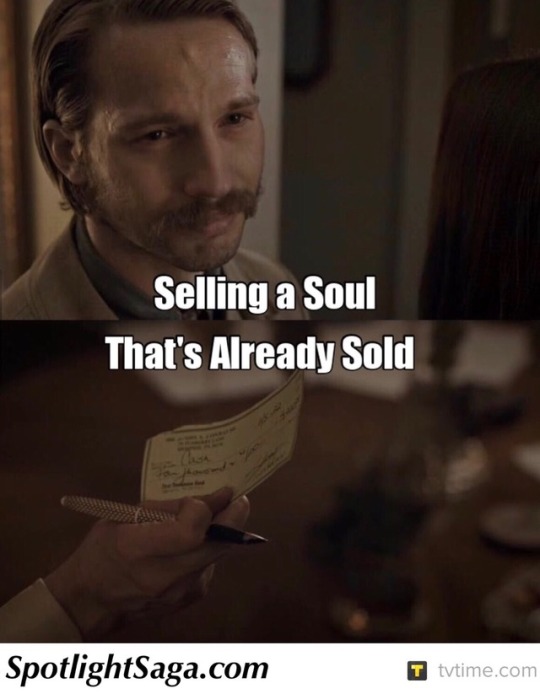
Kevin Cage of Spotlight Saga presents... A Rewind Review of the final episode of Quarry on Cinemax whose cancellation was just announced yesterday. As you'll see in the language of this article, I personally hold the show in high regard, even including it the Top 5 #BestOf2016 series we ran. Cinemax, who is owned by HBO claims they are revamping the network that is just now gaining a good wave of steam and building a respectable library. The Knick was also a groundbreaking series that recently received the axe from the same network, yet Strike Back that last ran in 2015 is already getting a reboot. What say you, Cinemax? We are incredibly disappointed by your decision to cancel this incredibly thought provoking Crime Drama set in a very real to life 1972 Memphis. Michael D Fuller, executive producer and co-creator of the show (along with (Graham Gordy) is a huge inspiration for me and for 'Spotlight Saga', inspiring me to include a more honest approach to political standpoints, something at the time I was very afraid to use in my writing. The following article was written shorty after the end of Quarry's Legendary 8-Episode run. Going forward, as much as I am frustrated with Cinemax, I think it's important to focus on the positives here and follow & support both Fuller & Gordy in any future projects or endeavors they may have. Thank you, Fuller. Thank you, Gordy. You have earned more than a few lifetime fans. Kevin Cage of Spotlight Saga reviews... Quarry (S01E08) Nuoc Cha Da Mon Airdate: October 28, 2016 (Cinemax) Ratings: Premium Cable/Streaming - Nielsen is Guessing! Score: 10/10 (An Extremely Rare Perfect Score) **************SPOILERS BELOW*************** *Poltical Views do NOT represent Spotlight Saga* Well, I asked for it... Basically begged for it, I even considered taking a day off work to just sit at home and watch it. Now, I've finally watched it, and I feel...changed. 'The Vietnam Scene' let's us peak into the PTSD origins and Mac's time at war, as well as providing a provocative theory on just what we might have been doing over there in the first place... Losing lives on both sides, our veterans returning home to a chorus of boos, met with thick walls of human disdain, and stop signs in every direction they turned. Single Camera, long take shots can be risky. Just look at Daredevil, a show that successfully used them in S1, then overused the same hallmark shots in S2. They simply cannot be your whole show, because one continuous 'sequence shot', particularly those that surround an upsetting action or disturbing sequence linger with the viewer, like the shots themselves linger on the situation at hand. In this case, a raid in Vietnam 🇻🇳 on a village with mainly fisherman, women, and children... Innocent lives lost in a war that in the end meant nothing but death, heartache, and terror. Of course that asshole of a captain commended Mac (Logan Marshall Green) and praised him to The Broker (Peter Mullan) at the end, 'He's a good soldier.' Yup, cuz he does what he's told without hesitation... Like firing the first shot without thinking, snowballing a cascade of death and chaos, topping off the whole experience by throwing a grenade into a covered pit that contained a toddler... A toddler who we are shown blown right out of the pit into fucking pieces. That's one thing that Quarry never does, shies away from violence, from the money shot... And it never feels exploitative, it just feels like that's the reality, a reality that the viewers should not be protected from. And so it goes... The Broker is no vigilante, tho he does give the people that he employs the benefit of small 'in-between' jobs that make them feel like they are doing good in the world. It's a game of chess, and he is Bobby Fischer in his prime, and a patriarch of the 70's... A king of a dirty unferbelly ruled by the almighty dollar and poppy fields as far as the eye can see. The day I wanted to take off work, just so happened to have three or four people at the bar discussing Vietnam. Of course, right? I immediately throw Quarry in the mix and of course, none of them had heard of it... Unsurprising, considering how hard it is just to obtain Cinemax, thank god for Amazon Video now! We discussed the length at which protesters treated the returning war veterans; Picketing, spitting, throwing objects, screaming and shoving homemade signs in their face... As if the soldiers ever had a choice in the matter. You enlist, You're drafted, you're trapped, you're owned, and just like Mac... If you are a good soldier you do what you're told like a goddamn robot, a machine without empathy, and then when you return home you have nothing. PTSD? In '72? Here's a pamphlet. 'Be glad the man has his legs and his arms,' the man at the VA tells Joni (#JodiBalfour) when she desperately seeks help for a man she cannot save herself. So there you have the people in control of our government, sending our brothers, sisters, fathers, and mothers over to fight a pointless war. Then you have the rich men, the patriarchs, who are able to come through and buy a slice of the action... A poppy field... A goldmine just waiting to make the rich man richer. And then you have protesters, mainly uninformed Regular Joes who only see the picture that's painted before them, like the SJW's today that picket and march through our major cities furthering the divide they claim they are trying to stop. Oh yes, that's the truth of the matter, a truth that blind rage and ignorance stop people from seeing. There is something inherently terrifying about the parallels of Vietnam 🇻🇳 to the wars and thousands deployed in countries like Iraq 🇮🇶 Iran 🇮🇷 Afghanistan 🇦🇫 Pakistan 🇵🇰 Kuwait 🇰🇼 Bahrain 🇧🇭 Saudi Arabia 🇸🇦 Syria 🇸🇾 Yemen 🇾🇪 And I could go on and on and on, places we have no business being, places that our country backwardly depends on for oil, or countries that have militias and terrorist organizations just sitting on oil fields holding them captive to prevent the chaos countries like ours and others have caused attempting to police the world and secure access to natural resources, while they themselves use the guns we have directly armed them with to oppress their people and then line the pockets of people like Hillary Clinton's with hundreds of thousands of dollars. No, I am no sympathizer, both sides make me sick. The whole thing makes me sick. Mostly, the human race makes me sick. A long time ago while living in San Francisco, I realized that the most beautiful and pure people are mostly at the bottom sleeping in the street or struggling at a minimum wage job, while the ugliest and ruthless people are at the top inviting a lucky few up to share in a night of debauchery, caressing their insecurities with thoughts of becoming their protég��s or possible arm candy while their young and their beauty is still intact. Just last week, less than a month to go in his final term, Obama abolished the 'Wet Foot, Dry Foot' policy, a policy that helped save thousands of Cuban 🇨🇺 lives and helped build the great city of Miami that I call home... This done in the spirit to 'normalize relations with our one-time foe.' While abolishing this policy *COULD* indeed do just that, hidden behind that very controversial and well known policy; Another policy, The Cuban Medical Professional Parole Program, was also nixed. That lesser known policy allowed the opportunity for Cuban Medical Professionals to come to the US through other countries to earn residency, citizenship, and jobs. A sneaky move, one disguised as a way to strengthen the relations between The USA 🇺🇸 & Cuba 🇨🇺. Just one of many examples that not everything in the painting is portrayed as it should be or relaid to the public highlighting the big picture as a whole. This is a man who promised us CHANGE, but the majority of these promises of change were broken. Under the Obama Administration more Whistleblowers were jailed under the Espionage Act of 1917, imprisoned, or forced to seek asylum, like Snowden in Russia 🇷🇺 and of course famous Wikileaks founder, Julian Assange, who is literally living in an Ecuadorian 🇪🇨 Embassy in London 🇬🇧. Then today Obama grants clemency to Transgender Whistleblower Chelsea Manning, shortening her 35 year sentence to end 3 decades early in May of this year, 2017. Why, Obama? A PR move to distract from other last minute changes and to surge an approval rating on the way out? Something to think about, especially when he was so adamant about putting those that expose our government's truths, lies, and nasty cover-ups behind bars or strand them in foreign countries that don't exactly provide the same freedoms. Meanwhile last year was the first year that I was forced to pay taxes, and not just because I'm penalized for seeking affordable medical treatment for cash, and not pumping money into the Insurance Industry, the failure of Obamacare. All of this happening, and a rich white New York female actress named Lena Dunham tells the world that she's never had an abortion, but she wishes she had. WHY?! Meryl Streep uses an acceptance speech to rile up SJW's. And to add insult to injury, she says an art form and sport older than her 50x over, MMA and Combat Arts are not really arts. WHY?! God bless some of Meryl Streep's performances, they are truly cinematic gold, but that doesn't automatically make her the High Queen of all Art, deciding what earns that prestigious label and what does not. I try and promise myself that I will not get political in my reviews, but honestly when I write emotional parallels I seem to get the most responses. And because of great television series like 'Quarry' that most definitely gets my stamp for my list of #BestOf2016 TV Series), they inspire me to put my ideas out there, my life stories, my origins, my secrets, my heartaches, my tales of happiness and tragedy... Because of series like 'Quarry' I am more honest with you than I am with anyone else in my life. It's scary to put these very personal, private, and passionate views and experiences out there. Like I said, the one rule I try to set for myself is try to keep politics (or at least pick and choose my crusades and battles) out of it, and to treat those with opposing opinions with respect and class... But here we have a moving, haunting portrait of political injustice, and it's inspiring. It's hard to stay quiet when there is so much injustice surrounding us, so much ignorance. I have literally seen people I love with all my heart throw away meaningful, lifelong friendships over this sham of an election on both sides. I am not a conservative. I am not a liberal. I am a man who is happy with very little... I have a slice of paradise in a city where I am very much the minority. I'm happy living life one day at a time, living a quiet life and practicing different forms of artistic expression, over the years learning that my gift is worth a bit of money, but still getting the hang of making it the center of my universe. I'm no hired hitman, but I've abused this body with serving, bartending, and even go-go dancing... At one point I was literally working day shifts serving tables in Miami, getting off at 4 or 5pm, then driving to Ft Lauderdale, dancing without my clothes at night until the early morning, trying to catch a few low-paying DJ gigs in between. Like Mac, we all have our demons, demons that many of us will never quite shake. We can defeat them, learn to live as harmoniously as possible with them, or let them destroy us slowly. Quarry is a vivid and honest tale of political injustice, racial divides, struggling human beings just trying to survive in a world where the odds are stacked up against them, a tale of broken men and women, the moments that make us feel alive, the moments that haunt us, a tale of a human being struggling with their sexual identity in a brutally violent and unaccepting world, one that is engraved and hardwired into them, broken egos, and a tale of how people can easily be turned into puppets with the almighty dollar and a simple plant growing from God's green earth. I found it very fitting that before the last sequence of scenes Mac goes to cast his presidential vote. Unfortunately it always comes down to the lesser of two evils... Republicans or Democrats, but both are evil and wicked in their own individual ways. To #VoteLibertarian or Green is unheard of (though this idea is changing and becoming more of a reality now, thank god) and for many years I considered the act 'throwing away' my vote, but with the candidates becoming increasingly hard to differentiate the pros and cons... Maybe it's time that everyone starts voting Libertarian, Green, some sort of other growing Independent Party... Or like Mac, just write in the late, great Otis Redding. My Step-Father has taken to the practice, and he's right... If you can't beat em', don't join 'em, vote for somebody else, ANYONE. Ive been told this is a problem in all countries, so on a worldwide scale I'm not sure if even Hillary Clinton vs Donald Trump was even the hardest decision a voter has had to face... We had it easy, The Philippines 🇵🇭 had to settle for Rodrigo Duterte, a MADMAN who encouraged the people of his country to hunt down and murder people suffering from the disease of addiction. Somethings gotta give, the division I see in our world today frightens me, but most of all it saddens me. For now, here in the US, what's done is done. We must allow things to play out as if the world 🌎 was our television series. Stop the division. Stop the hate, on BOTH sides... And let's take things as I have learned to live, one day at a time. Being unified if things go wrong will be a lot better than being a nation torn apart. Maybe the future will surprise you, maybe it won't... Just hold on to your empathy and everything will be alright. It's the only thing we have left. We have to do better.
4 notes
·
View notes
Text
A SHORT HISTORY OF FEMALE JUDGES IN JUDGE DREDD FROM 2001 TO 2004
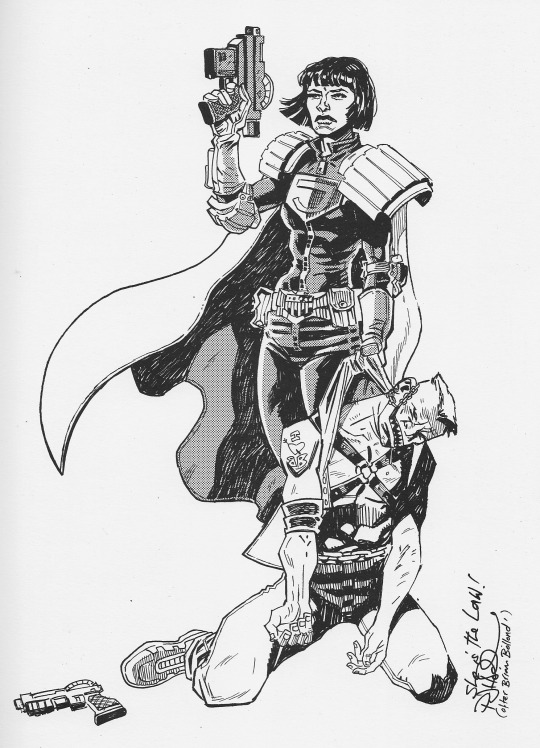
As Mega-City One changed leaders at the turn of the 21st Century, so did 2000AD itself, having been bought off Egmont’s hands by independent UK video game developers Rebellion. The early days of this newfound alliance were surprisingly quiet, as Rebellion had never tried their hand at publishing before and the 2000AD editorial team needed time to rebuild and reorganize. So it will take a while for the next giant city-wrecking epic to come by.
In the strip, DeMarco’s departure for the Megazine and Anderson’s continued spinoff success combined with Judge Hershey’s promotion to Chief Judge naturally brought about a sharp increase of the latter’s appearances. But as great as it is to see a character grow into a role in real time, the position does come with a particularly insidious couple of downsides that have plagued her pretty much ever since. More on that later, but for now, let’s get started.
(Previous posts: 1979 to 1982 - 1982 to 1986 - 1986 to 1990 - 1990 to 1993 - 1993 to 1995 - 1995 to 1998 - 1998 to 2001. All stories written by John Wagner unless noted otherwise. “Cover” art by PJ Holden)
Blog favourite Staz Johnson kicks things off drawing “The Sons of Katie Didd” in progs 1248-1249 (June 2001), which features a Judge Vance assisting Dredd with an investigation. She even shows her face too, which was something a bit missing from a lot of background female judges in previous years. Immediately afterwards, we get the last story written by Garth Ennis for the prog, one that would prove divisive with readers even to this day.
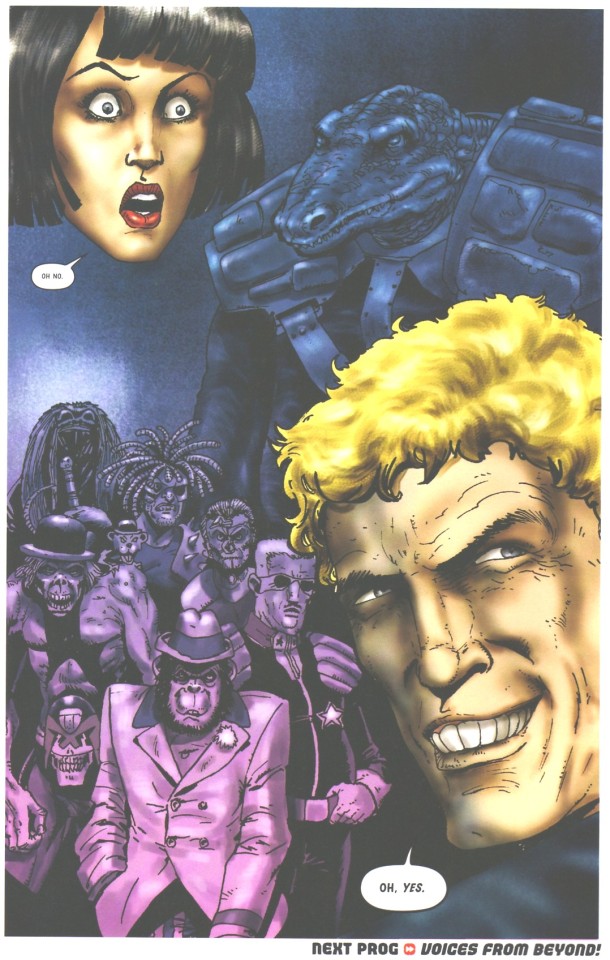
Written as part of a deal to get the rights to his early “Troubled Souls” series back, “Helter Skelter” (drawn by Carlos Ezquerra and Henry Flint, progs 1250-1262, June-September ‘01) is Ennis’ unabashed love letter to all things 2000AD-related, although mostly Dredd. The story concerns a group of scientists who use interdimensional jump technology, reverse-engineered from the Dark Judges’ d-jumps, to send unmanned probes to several alternate universes. However, this catches the attention of one of those universes’ version of Murd the Oppressor, the Necromancer of Necros who’d haunted Dredd and his crew back in the “Judge Child Quest.” This Murd came from a universe where he had succeeded in feeding Dredd to his toad, and upon learning of an alternate reality where Dredd had bested him, travelled across the dimensional gulf to gather a party of many other classic Dredd villains. And together, they came up with a plan to travel back to the main dimension and kill him and take over Mega-City One all over again. It’d seem Ennis had picked up some multiversal habits from working at DC.
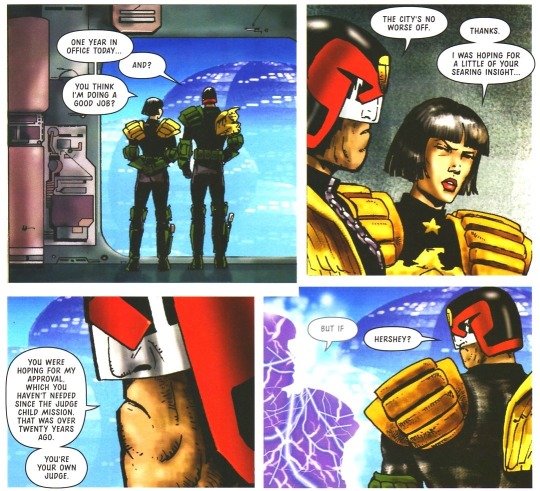
The only female judge in this story is, rather predictably, Chief Judge Hershey. The above panels belong to the second episode, and they do give us a nice, albeit small glimpse into her mindset one year into her first term. It’s interesting to see a bit of uncertainty from her, since right from day one she’s been shown to be fairly comfortable in her role, and Dredd quickly stamps it out by making it clear that she can’t nor should lean on him for approval, even managing to slide in a bit of double meaning with the “You’re your own judge” comment. A harsh, but effective tactic. Perhaps too effective, given what’ll happen a few years from now.
Unfortunately, sharing the same space-time for almost a tenth of a second with an alternate universe Call-Me-Kenneth puts her out of action for most of the story (not to mention leaving her in a rather undignified position), and when she comes back it’s mostly so alt-Judge Cal can have someone to monologue at. We do get a nice little bit of continuity, however, when alt-Fink Angel, whose main universe counterpart had tried to gruesomely murder him back in “The Fink”, calls dibs on her as the rogues gallery tries to decide what to do with the survivors of their initial assault. Ultimately, it’s Murd who wins the discussion, and so we get one Hell of a page:
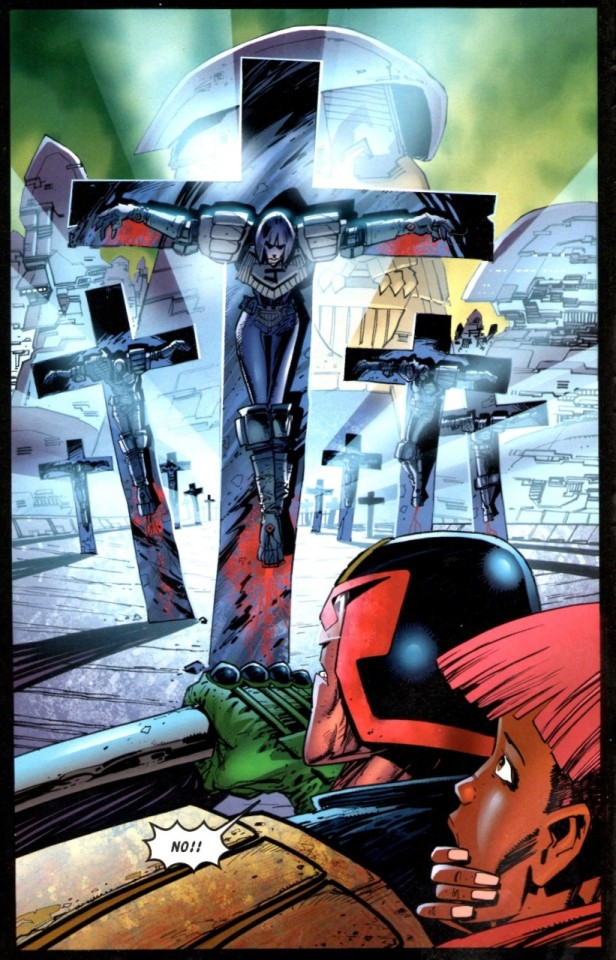
The sole survivor of Murd’s fun and games, Hershey is nursed back to health by Dredd in a citizen’s apartment and Ennis, perhaps feeling a bit guilty over the whole ordeal, does give her a bit of respect by having Dredd tell her she was “too strong” to die. In all fairness, if there’s one guy who’d know what it takes to survive crucifixion, it’s Ol’ Stoneyface. Unfortunately this is one of those stories that end with Dredd (mostly) single-handedly beating the tar out of everyone else, so there’s not much else for Hershey to do.
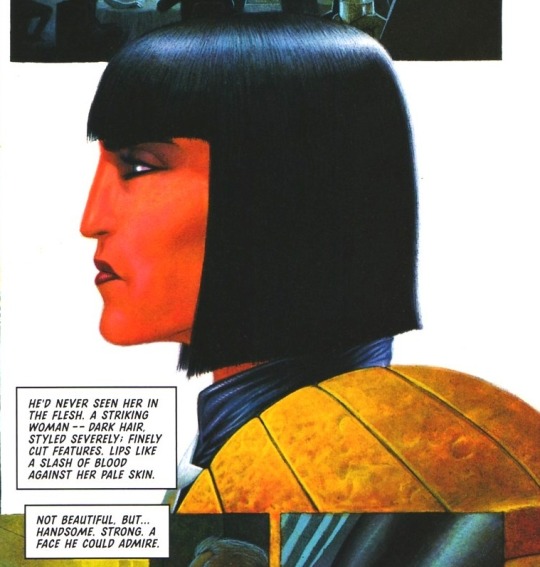
She does take a more center stage in progs 1263-1266′s “On The Chief Judge’s Service” (October ‘01), gorgeously painted by Colin MacNeil. A sequel to “The Chief Judge’s Man”, it opens with Armon Gill, the Justice Killer, seeing Hershey live for the first time in a lecture and then silently murdering a citizen for spreading rumors of her sleeping her way to Chiefdom. Besides showing how much Gill’s obssession has grown, it is interesting to see an outsider’s view of Hershey. We know how citizens feel about judges in general, but opinions on particular judges besides Dredd are much more rare.
Much like in the original there’s not really a lot for Hershey to do in this story, although when Gill is captured as part of a larger plan to kill a previous Justice Killer now languishing in a cube, we do get to see her reaction to being accused of covertly masterminding the murder of dozens of innocents. It’s pretty much what you’d expect from her at this point:
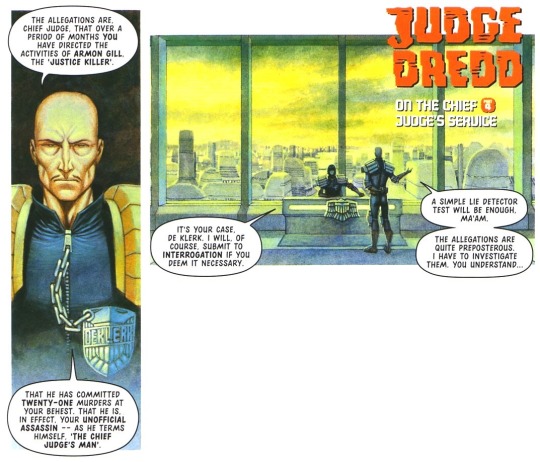
On one hand, this kind of matter-of-fact coolness and honesty are perfectly in line with her character so far, not to mention being admirable qualities in and of themselves. But on the other, this is a good example of Hershey’s biggest problem as a character moving forward: there’s not really a lot of genuine depth to her. She’s certainly an excellent judge, but things like her more liberal views or her relative inexperience, even her underlying lack of desire to be Chief, are just not coming out to the surface. What we’re left with is someone who’s really good at her job, but since so many of Dredd’s stories are based on things going terribly wrong, it’s not a quality that gets showcased a lot. And without McGruder’s conflictive nature, Hershey risks falling into the same bland mold of most Chief Judges before her.
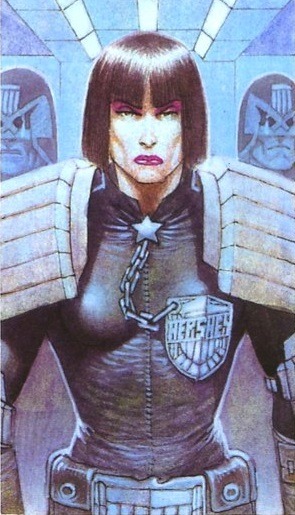
(Slight art error from MacNeil here too: Hershey is wearing the straight shoulderpads and star ornament of Chief Judge, but also her regular badge)
Prog 1271′s “Driving Desire” (December ‘01), by Cliff Robinson introduces Judge Vonne Hollister, a Wally Squad operative under the guise of a slabwalker whom Hershey promotes to the Council of Five as her way of bringing in “the true voice of the streets”. Which is certainly more in tune with how she was portrayed during her candidacy, but as far as this story goes it’s less about any actual lasting developments and more about getting a few laughs from the rather... candid Hollister jokingly trying to tempt her straight-laced colleague, Tek Judge McTighe. A point could be made about Hershey trying to bring more women into the Council, but certainly not by the story itself.
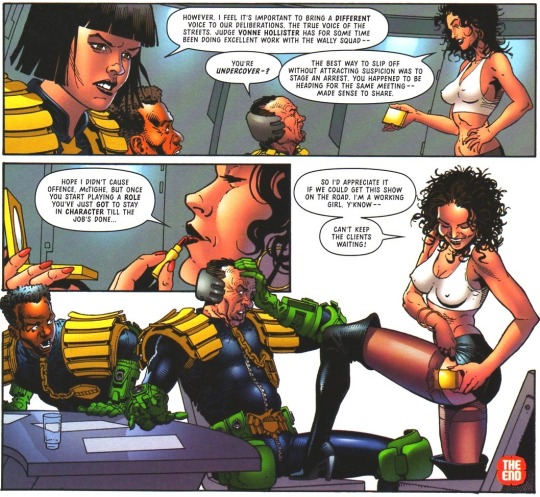
2002 kicks off with prog 1276′s “A Walk in the Park”, written by Gordon Rennie and drawn by Paul Marshall, where Dredd chaperones a group of cadets through a training exercise in one of MC-1′s last surviving parks, among them a girl by the name of Vesey who shows herself to be a bit of a softie, though she hardens up quite quickly. The very next week, we get a small Hershey sighting at the end of prog 1277′s “First Blood”, by Alan Grant and John Burns (February ‘02). Of note is that Dredd calls her by her rank instead of her name, which makes sense since Dredd is always a bit more of a robotic bastard when Grant’s writing him.
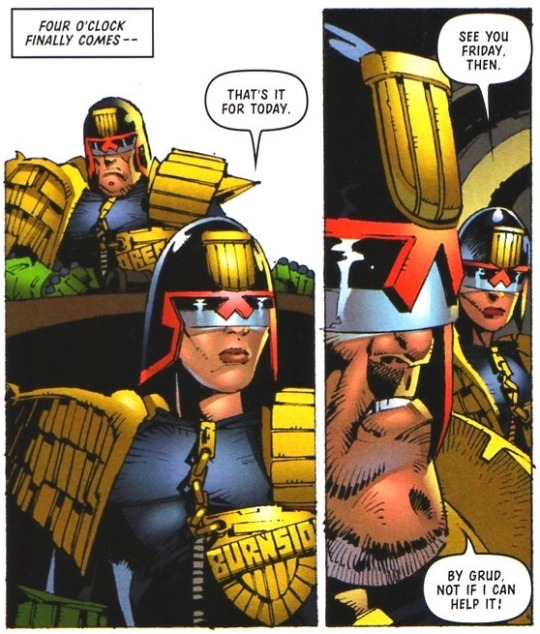
Cam Kennedy makes a double appearance in this post, first by drawing a Judge Ansey helping Dredd deal with the recurring Branch Moronians and their ill-fated hostage-taking attempts in “It’s Deja Vu All Over Again Again” (progs 1282-1283, March ‘02), and later with one of my all-time favorite comedy Dredd strips, “Block Court” (prog 1284), where Judge Burnside helps Dredd get through the soul-crushing horror of old-time due process. There’s also a Brit-Cit judge by the name of Dolman in “Escape from Atlantis” (art by Paul Marshall, progs 1285-1287, April ‘02), although sadly she’s unable to escape getting shot to death by androids.
The next mini-epic is the ten episodes long “Sin City”, drawn by Kev Walker, which ran from prog 1289 to 1299 (May-July ‘02). The eponymous Sin City is a giant floating city that tours the world, allowing visitors to enjoy all manner of illegal activities thanks to its independent sovereignty. Of course, Dredd is not a big fan of this scheme and would rather not see any of his citizens making it their vacation destination of choice, but as it turns out, his boss has other plans. And so, about two years into her first term, we finally get the first of several voice-raising, rank-pulling, table-slamming, “Why are Mommy and Daddy fighting?” rows between Dredd and Hershey:
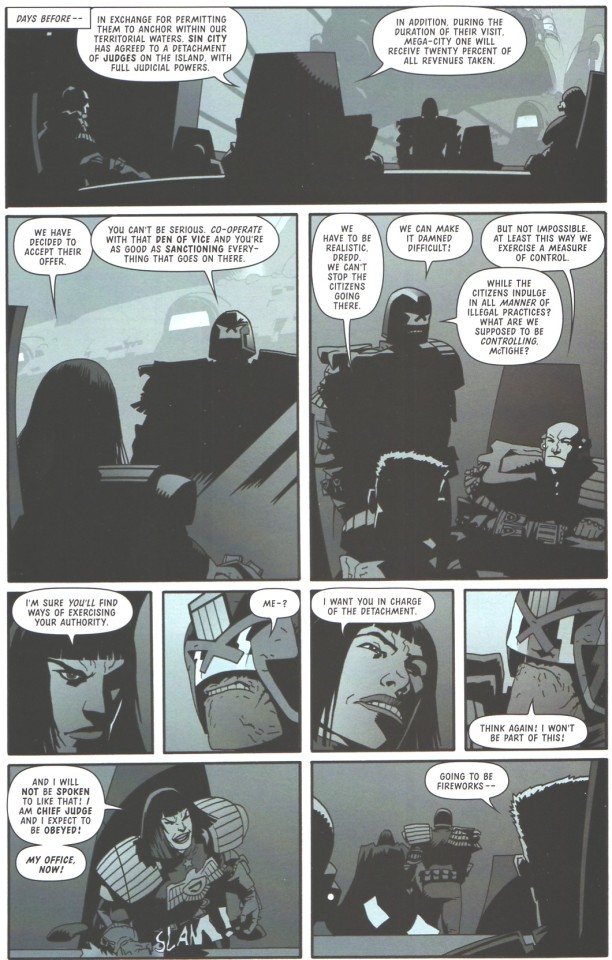
... which turns out to be pure theater on Hershey’s part to hide the true nature of Dredd’s assignment: an undercover operative in Sin City has reported the presence of an international terrorist with a mad-on for Mega Cities called Ula Danser on the island, and then promptly vanished after trying to get more information. So Hershey wants Dredd on the island to pick up the trail and find out what’s what. This also opens the door for Judge Hollister to reappear, leading a small army of Wally Squad judges into Sin City, including one Judge Molotar who ends up impersonating Ula near the story’s end. There are two other street female judges in the story, Kaplin and Blane, but they don’t really contribute much to it besides filling up crowds (and in Kaplin and Molotar’s case, casualty lists).
Overall there’s not much to say here in regards to our main subject, but Hershey’s penchant for subterfuge and espionage is beginning to show from underneath her liberal cover. She’s clearly gotten used to lying through her teeth and hiding ulterior motives, but she still finds a place in her mind for doubt and regret when Dredd fails to stop a chemical weapon from being released inside Sin City and infecting thousands of citizens, requiring the whole island to be quarantined while the virus runs its course. So we see that Hershey’s lack of ambition doesn’t equate to a lack of standards, and she feels a strong responsibility to do better, which is not something many other chief judges have expressed. At least, not until a major crisis nearly wipes out the entire city.
Moving on, Colin MacNeil returns to paint a couple of background judges in “Blood and Duty” (1300-1301, July ‘02) and Ben Willsher makes his first appearance in these posts by drawing an unnamed med judge at the end of “Case for the Defense” (1303, August ‘02). Ian Gibson returns to draw the Gordon Rennie-written “Give Me Liberty” (1304-1305, idem), another personal favorite comedy story. In it, we get to see Hershey living up to her promise of listening more to the Council, although ultimately it’s Dredd’s suggestion that she follows. And much like McGruder way back in the day, Gibson takes the liberty to redesign the Chief Judge’s badge:
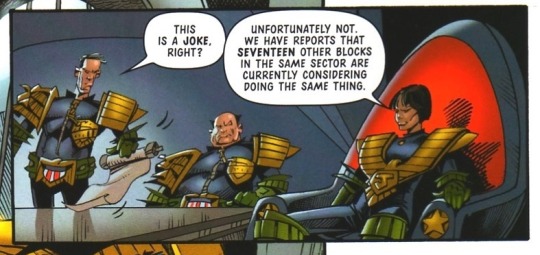
For a bit of variety, we have a vid-fone judge in “Class Project” (art by David Millgate, prog 1310, September ‘02) and an SJS judge by the name of Vickers who conducts a cavity search on a cit mostly for fun and giggles in “Waiting” (by Rennie and PJ Holden, 1312, October ‘02). Carl Critchlow brings out his new artstyle in “Out of the Undercity” (1313-1316, November ‘02) which has Dredd talking to an unnamed female judge who’s wearing a helmet but also the double shoulderpads of a Tek, or even a Chief Judge, so it’s not terribly clear who she is. Another female judge appears as part of a disciplinary council in 1317′s “Reprisal” (art by Paul Marshall, idem) which serves as a small coda to “Sin City.”
While not actually featuring her, prog 1318′s “Open Justice” (by Rennie, Mike Collins and Dylan Teague, idem) deserves an honorary mention for using the framing device of an e-mail sent to Chief Judge Hershey from a disgruntled criminal as part of a new citizen relations idea. Which, in true Justice Dept. fashion, ends up being a total lie.
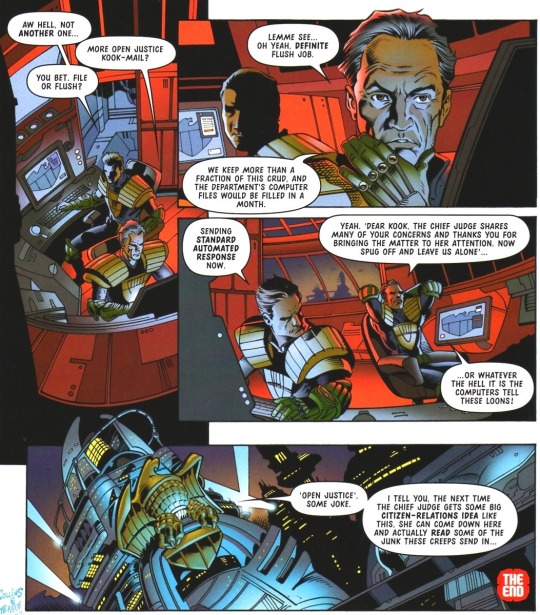
(After over five years of working in different call centers, this is an intensely relatable page for me)
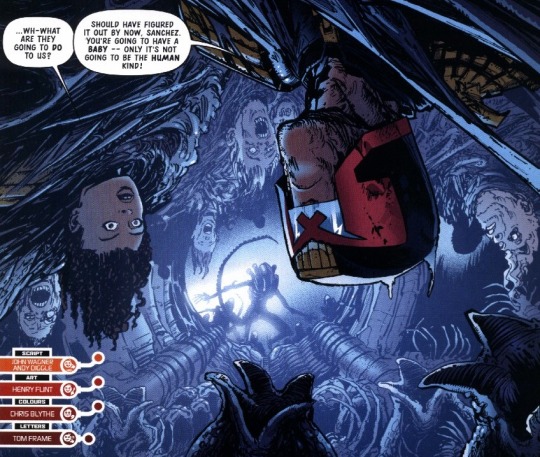
Having already tango’d with a Predator in the 90s, Dredd finally filled the other side of the intergalactic ugly motherdrokkers dance card in 2003′s “Judge Dredd vs Aliens: Incubus”, written by Wagner and Andy Diggle and drawn by Henry Flint. Starting on the new year’s special and running until April’s prog 1335, the story co-stars Judge Sanchez, a rookie judge fresh out of the academy who is having second doubts about the whole street judge thing, freezes under fire but ultimately manages to find the courage to fight back and help Dredd save the day and... have we been here before? Yeah, Sanchez is pretty much a recycled Castillo, with her character arc condensed into one 15 part storyline. The biggest difference is that Castillo was already a foul-up when we met her, while Sanchez is still teetering on the edge. But apart from that, they may as well be the same character, in all honesty.
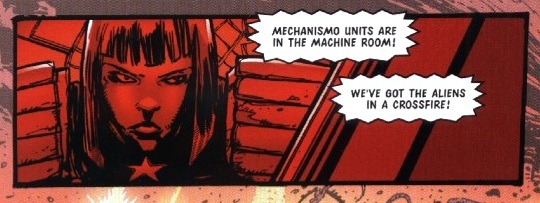
The story also has a Judge Pitt who gets her fingers burnt down during the first encounter with the xenomorphs, and of course, Chief Judge Hershey also shows up, mostly just to look really cross as the aliens murder their way through the Grand Hall and to authorize the use of mothballed Mechanismo units, although it was Giant Jr.’s idea. So overall, not much else there either.
A loose end is finally tied in “The Trial of Orlok” (art by Cam Kennedy, progs 1336-1337, April ‘03), which features a Judge Wing as part of a special court that decides the final fate of Orlok the Assassin. No points for guessing what that is. Hollister and Hershey also make small one-panel appearances, although the latter is drawn with regular shoulderpads. A couple of weeks later, Judge Lucas fills a crowd in prog 1339-1341′s “Hard Day’s Night” (May ‘03), written by Robbie Morrison and drawn by Patrick Goddard and Dylan Teague. But going back to loose ends...
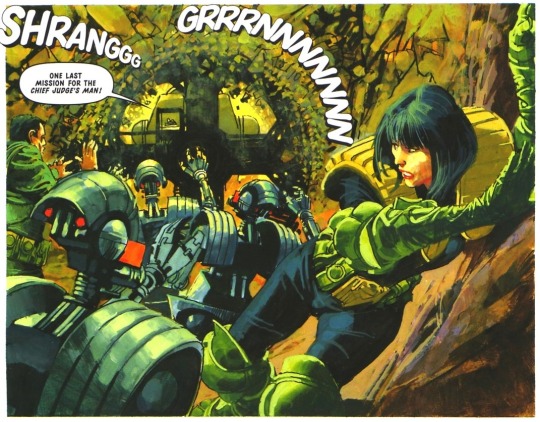
Armon Gill’s third and final outing, “Revenge of the Chief Judge’s Man”, appeared in progs 1342-1349 (May-July 2003) and was drawn by John Burns. It opens with a bit of a surprise return as Dredd visits the Cursed Earth penal colony where Gill is being held to meet with its warden, Judge Jura Edgar, last seen about two years ago when Hershey all but exiled there. To everyone’s surprise, including Edgar’s, Dredd asks her for help in uncovering the identity of the man behind the Chief Judge’s man. And despite being resentful of her demotion, Edgar agrees, half out of curiosity and half out of genuine surprise of Dredd’s humility.
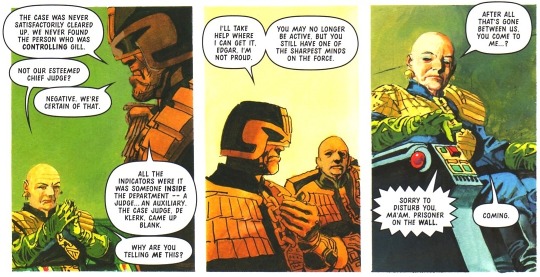
Although brief, Edgar’s role here resembles a more hard-edged Miss Marple, sans the colorful anecdotes. With only a handful of second-hand information to rely on, she accurately produces a psychological profile of Gill’s handler and suggests a couple of possible starting points for Dredd. The narration also gives us a glimpse of Dredd’s own feelings on her, including a lingering regret that it had to come down to this. Even with all that happened there is a strength and dignity to Edgar that he can’t help but respect. But despite her and Dredd’s efforts, Gill manages to escape and sneak his way back into Mega-City One.
Back in the Grand Hall, Dredd tries unsuccessfully to convince Hershey to cut down on official engagements, and although she recognizes the risk, duty comes before security. It’s interesting that, while other Chief Judges would’ve met this threat with a bit of bravado (like the time Griffin held a council meeting on an open terrace, or McGruder herself giving speeches while snipers gunned for her head), Hershey’s reaction is comparatively fatalistic. But out-living three Chiefs while still a member of the Council of Five must really put things in perspective.
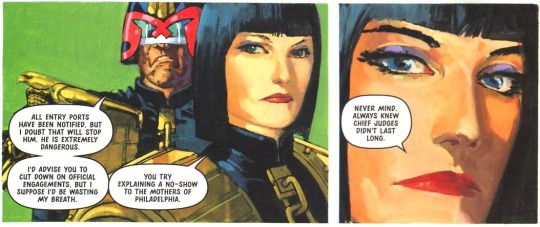
Such fatalism turns out to be 100% justified, as Armon Gill infiltrates an official visit to a tunnel project, commandeers a giant drill and even with three bullets in his chest and Dredd’s fist all over his face, still succeeds in brutally killing the Chief Judge, who dies screaming as she’s shredded to pieces by the deadly machine.
Anyway, our next stop is prog 1360, where--oh wait, hold on, turns out Dredd managed to convince Hershey to use a robot double for once. Overall, there’s not much Chief Judge in the Chief Judge’s Man trilogy. The few snippets of characterization we do get are nothing too insightful or surprising, and by revealing the real face behind Gill in the very first story, it doesn’t even entertain the possibility of Hershey actually being guilty of ordering the murder of innocents. Bit of a missed opportunity there.
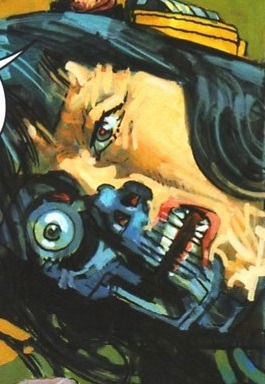
“I need a vacation.”
Ok, for real now, our next stop is “See Zammy Run”, by Gordon Rennie and Iñaki Miranda (progs 1360-1361, October ’03), which features a Judge Gulacy, likely named after famed Shang-Chi and Batman artist Paul Gulacy. A week later, Ian Edginton and Steve Pugh introduce us to Judge Jules, a sector house chief with a nasty case of perps dying in lockup, in prog 1363-1364’s “Inside Job” (idem). Hershey returns for a very small cameo at the start of “Meatmonger”, by John Smith and Siku (who had already drawn one of her solo adventures in the Megazine, many winters ago) in progs 1365-1370 (November-December ’03). The first story of the new year, “Cincinnati” (art by Carl Critchlow, progs 1371-1373, January ’04) involves a blind protester assaulting and seemingly seriously wounding the Chief Judge, causing a massive manhunt across the Cursed Earth. And an unnamed female judge assists Dredd in a hostage situation in prog 1374’s “S.A.M.”, (idem) drawn by Val Semeiks and Cliff Robinson.
And then we get to 1375-1377′s “Master of Fear” (February ‘04), written by Alan Grant and drawn by John Burns, which co-stars Psi-Judge Shakta, Anderson’s friend from the Megazine. Or maybe, someone with the same name who looks absolutely nothing like her:
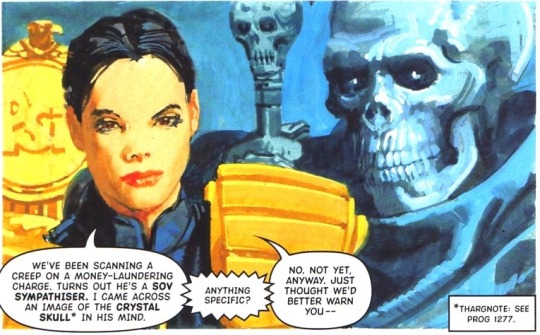
For argument’s sake, here’s Arthur Ranson’s original Shakta:
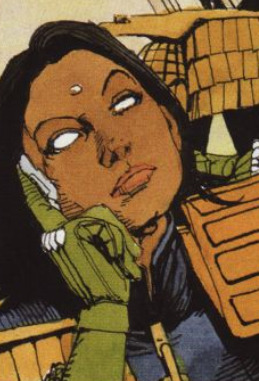
That... is some change. It does seem to have gone mostly unnoticed at the time, probably since people were busy shouting in the Nerve Centre about Steve Moore’s “Valkyries.” To add insult to art error, she doesn’t even get to do much, since Dredd rescues himself in the end.
Moving on, we get a couple of background cadets and a female academy attendant in “Cadets of the Blood” (Ezquerra, progs 1378-1381, March ‘04) and that leaves us comfortably at the start of the last long thrill of this post, prog 1382-1386′s “Gulag”, by Gordon Rennie and Charlie Adlard (April ‘04).
The premise is simple enough: satellite imagery reveals evidence that some Mega-City One judges, likely Apocalypse War prisoners, are being held in a secret sov gulag. A special meeting with Justice Dept’s defense division (two of which are female) is held and a full-on military incursion is dismissed as potentially too harmful to sov relationships. Dredd, who of course is in attendance, is having none of it, and we get a magnificent demonstration of his arm-twisting prowess:
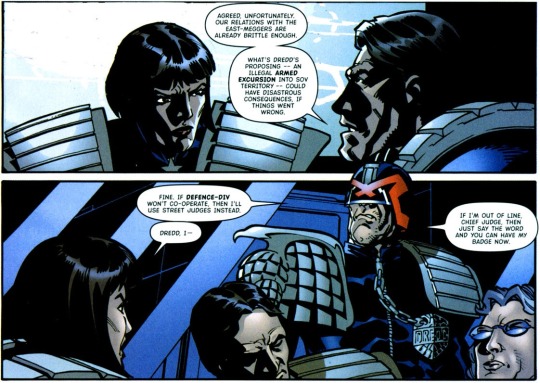
Of course, Hershey is hardly the first Chief Judge to get this particular threat. All the way back in “Robot War” we had Dredd straight-up giving his badge to Goodman and “quitting” until things got hot enough for him to call himself back into action, because deep inside that leathery exterior beats the heart of a total drama queen. Luckily, this time there’s no need for such antics, as Hershey dismisses the council and has a meeting of her own with Dredd that neatly encapsulates everything good and everything bad about their relationship:
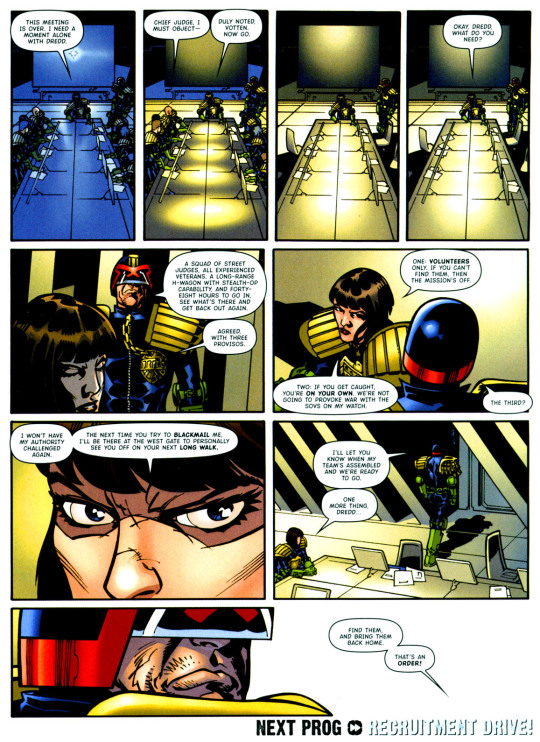
By their very positions, Dredd and Hershey see different things. Dredd is all about the small picture, the street level, tiny things that can lead to larger conflicts, and like the street judge he is, his solutions are short and to the point (and usually brutal). Hershey, meanwhile, has to look at the bigger picture. She can't afford anything else. But coming from street division and having worked with him for so long, she understands and agrees with Dredd far more often than her position should. So she gives him what he wants, but also makes sure to establish her own terms as well, which are grounded in her established penchant for subtle, covert operation (although how she expects the sovs to believe MC-1's biggest judge was not acting with the consent of their own department is anyone's guess). Together, they form a two-pronged approach to Mega-City One's affairs, with Dredd keeping an ear on the street and an eye for simple solutions, while Hershey deals with the larger problems and shadier business that Dredd refuses to engage in. And if Dredd sees something that Hershey might have missed, he knows he has a direct line to her, to the highest power in the city who is also sympathetic to his way of thinking.
But that's where the relationship begins to strain: in Dredd's abuse of that closeness, strained by his reckless attempts at arm-twisting. To Dredd, letting nebulous compromises and escalating fears taint his ability to act decisively would be tantamount to treason, and the more the ruling bodies of the department advice caution, the more likely he is to blackmail them into action. And Hershey sees through it immediately. She's not willing to entertain Dredd's antics, but finds herself in the awkward position of agreeing with them. And the more Dredd pushes and oversteps his boundaries trying to strong-arm his own boss into righteous but potentially devastating decisions, the more Hershey feels it. The prongs risk breaking. And while first seen here, this is a conflict that will reapper in various forms and even reach a climax of sorts nearly ten years later.
Going back to “Gulag”, Dredd’s team of volunteers has a fairly respectable female count: Judge Morinta is a med-judge with a taste for modifying weapons that will turn out to be highly valuable on the field, Judge Kleinman is a gruesomely scarred street judge who had already spent four years in one such gulag, and there’s a surprise return in the form of Psi-Judge Karyn making her weekly prog debut. Last seen in the pages of the Megazine, Karyn’s logic for volunteering is, quite frankly, impeccable:
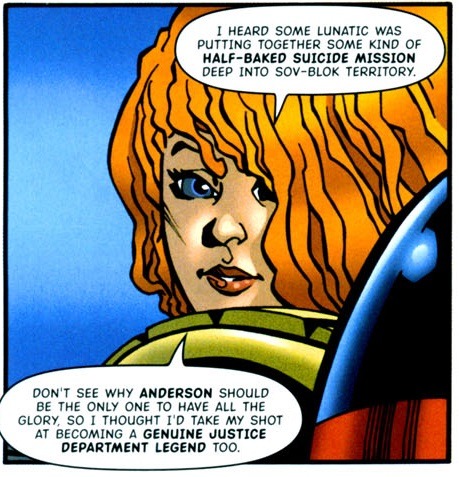
With boots on the snow, Morinta quickly proves her worth by arming everyone with tranq darts to sneak into the camp undetected. Inside, the team finds an empty barrack with the badge numbers for several justice department judges scrawled on the wall, and Karyn confirms Dredd's suspicions by reading the lingering emotions of the people who were kept there. However, they are long gone, moved somewhere else, and everything turns out to be a trap set by War-Marshall Kazan's clone son, Anatoli. Things turn ballistic soon afterwards, and Morinta gets another chance to shine thanks to a special dart with a chemical that blows up spectacularly when in contact with human blood. Karyn also pulls her weight by mind-controlling a sov tank into a bit of friendly fire, and everyone's generally having a pretty good time. Except for Kleinman, who's hit with a tank shell and dies in the battle.
Just when the rest of Dredd's squad seems to be about to end up the same, Justice Dept reinforcements arrive, shoot out the sovs, extract Dredd and company and blow up the entire gulag. All that's left is for Dredd to explain himself to the council, who are worried that his actions will instigate a new apocalypse war. He assures them that the sovs won't do anything, however, since now they have evidence that they kept and still keep Mega-City One judges prisoner decades after all hostilities ceased. Of note here is that Hershey and the council didn't know this and still gave the order to rescue Dredd and his team, so someone up there must've decided that he and his team were worth more than possible nuclear warfare. And although the story doesn't explicitly say so, the most likely source of that order has to be the Chief Judge herself. Especially when, once again, she has a private meeting with Dredd to reveal the mastermind behind the ruse.
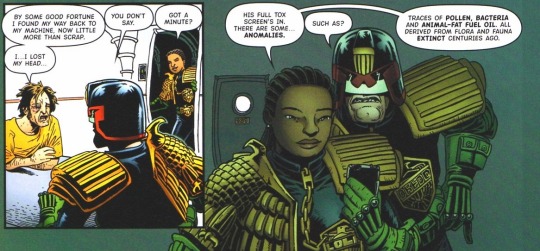
Rounding up the post we have three more small roles: an unnamed black judge harasses a hapless citizen in the hilarious “Finger of Suspicion” (Cam Kennedy, prog 1387, April ‘04). John McCrea draws another female judge in “Last Respects” (written by Gordon Rennie, prog 1389, May ‘04). And in his first appearance on this retrospective, D’Israeli draws another black judge called Lola in the Ian Edginton-written “Tempus Fugitive” (prog 1390, idem). By some coincidence, both the first and the last of this trio have pretty stocky bodytypes, but it’s always nice to get some variety instead of swapped heads on the same body. As for wether said variety will be maintained, we’ll just have to wait and see.
On our next episode: Chief Judge Hershey’s first real crisis goes thermonuclear! And that's just the start of her problems...
#2000AD#Judge Dredd#Female Judges#John Wagner#Garth Ennis#Gordon Rennie#Alan Grant#Carlos Ezquerra#Henry Flint#Colin MacNeil#Cliff Robinson#John Burns#Cam Kennedy#Kev Walker#Ian Gibson#Mike Collins#Dylan Teague#Charlie Adlard#D'Israeli#Chief Judge Hershey#Judge Hershey#Judge Hollister#Judge Sanchez#Judge Edgar#Judge Shakta#Maybe?#Judge Karyn#Judge Lola
16 notes
·
View notes
Text
Reaching Ryan and Giving Grace by Megyn Ward
“Every story has to start somewhere. Maybe this is the start of yours and Ryan’s.”
So I finally finished the Gilroy Glan series and all in all I enjoyed the story and the characters.
Like I expected, these two books definitely weren’t my favorite, but I did end up enjoying their story more than I anticipated and I really enjoyed getting to see the other characters again; I also think their relationship moved along too fast especially compared to the other relationships, I knew going in that they wouldn’t have years under their belt, but I expected longer than like two weeks and then five months apart and then declarations of love
I liked the premise of a injured military guy and a single mom, but their romance felt rushed and the way that Ryan talked about himself (warning: he frequently uses the r-word which felt over the top and unnecessary) and his toxic masculinity was suffocating. I understand what the author was trying to do with his character and his situation, but it simply made it less enjoyable to me than the others.
If you read the rest of the series, I would probably still recommend reading these two books (just know what you’re getting into when you start) in order to have the full picture and revisit the other relationships, but I’m not sure if they would really work as a standalone duet.
Keep reading for some cool quotes from both books!
Reaching Ryan:
My big sister, Cari and I have a lot in common. We both have blonde hair and blue eyes. We’re both tall for women, although she’s a bit taller. We’re both allergic to mushrooms, and we’re both jerk magnets. Seriously—if it drives a Porsche, uses teeth whitening strips and has even considered a spray tan, neither one of us can spend more than fifteen minutes in a public place without attracting the attention of what I call the Jerkus Erectus.
He looks right at me when he says it and for some reason, the word sounds like a dare. Like he’s challenging me somehow.
I remember I made her nervous. That she didn’t particularly like me very much. Didn’t feel sorry for me either. Didn’t look at me and see some helpless gimp. Talking to her, for the first time since what happened to me happened, I felt like myself. That’s what I remember about her.
I’ve never in my life known a man as devoted to a woman as Con is to my sister.
Even though I should, I don’t question it. I don’t examine it too closely because I’m afraid if I do, it’ll break apart in my hands. Turn to dust and leave me behind like everything else. Like everyone else. So, I don’t question it. I don’t ask why. I just hold on. Let it take me.
“I asked for the truth and I got it.” He shrugs before lifting his cup to his mouth to take a drink. “I’d be a hypocritical asshole if I got mad just because I don’t like what you have to say.”
He doesn’t tell me before what. I have a feeling it isn’t any one thing. That before is a collection of events, too heavy and personal for him to unpack in front of me. That for Conner, family means something different than it does for Patrick and despite the fact that he gave my financial support his stamp of approval, I haven’t quite met the terms of his definition.
“He doesn’t remember how to be himself and I’m hoping that spending time with you will remind him.” He says it like I’m a spring lamb, being led to slaughter. Like I’m being offered up as some sort of sacrifice and he doesn’t even feel particularly bad about it. “And if he’s telling you to run, I’d say it’s working.”
"That’s up to you.” He says it gravely, like he knows I’ve already made up my mind. Like he knows exactly what happens next.
That’s the bitch of TBI. When you’re in it, you have no idea what’s real. If it’s safe to ignore the demons screaming at you. If the screams carry truth or lie. So it all becomes truth. It all becomes real because the second you let yourself believe the demon is a lying, it proves you wrong.
“If I went around posturing every woman, or man for that matter, who looked twice at Conner, I’d never get any work done.” Taking another drink, she sets her glass next to mine before reaching for the bottle to top it off. “Besides, if I felt the need to plant my flag every five minutes that would be a pretty strong indicator that Conner was never mine to begin with.” She says it like a woman who knows, unequivocally, that the man she loves, loves her back. That he’s hers forever as much as she is his. For a split second, I’m so envious, I can barely breathe past the knot of jealousy tangled around my throat. It’s not about Conner. It’s not about her shoes or the fact that she wears the kind of clothes I’ve only ever seen in magazines. It’s about the fact that she has someone. Someone who loves her. Someone who looked past all the things wrong with her and found their other half. The piece they were missing that makes them whole.
“You were never ugly.” The voice, slightly annoyed and distinctly male, lifts my gaze from Henley and I find Conner standing a few feet away, leaning against the kitchen counter, hands dug into the front pockets of his jeans like he’s been standing there for hours. If she’s surprised by her fiancé’s sudden and seemingly magical appearance, Henley doesn’t show it. “Your opinion doesn’t count, Gilroy,” she says struggling to sit up to look at him over the back of the couch. “You’re completely biased.” “Daisy, my opinion is the only opinion that counts.” Conner gives her a lop-sided grin. “Biased or otherwise.”
“Yes.” The word comes out on a breath and if desperation ever had a sound, that was it.
Giving Grace:
Instead of screaming, she says my name again, but this time it sounds different. Softer. Breathless. Like she used all the air in her lungs to form that single word and she might die on the breath of it.
A dip and crest on the Ryan O’Connell emotional roller coaster. I’ve been riding it for days now and instead of clawing for the escape hatch like any half-sane, rational human being, I just tighten my seatbelt and brace for the next stomach-busting drop. I should be scared that Ryan O’Connell has the ability to rob me of my sense of self-preservation and overall common sense. And I should be downright fucking terrified that he does it without even trying.
There is nothing impulsive about the way Ryan is touching me now. Nothing rash. This is intentional. It’s real and once it’s done, it won’t be ignored and it won’t be forgotten. Not by either of us. Because what happens next will either bind us together or break us apart.
Which is why you broke things off, remember. Because you can’t save him—no one can. Not if he doesn’t want to be saved.
It’s better than it used to be. A hell of a lot better. So much better that there are times that I forget what happened to me. That I’m not the same and never will be, but better doesn’t mean gone. It doesn’t mean same.
“Of course Molly’s yours.” I say it louder than I mean to, my tone sharper than I want it to be. Probably because hearing the truth spoken out loud stings more than it has a right to. Because even though Molly isn’t mine. I want her to be. Wish that she was. Love her like she is. “No one ever said she wasn’t.”
But I’m angry just the same. Probably because he let me do it. Let me walk away. Didn’t chase me down and drag me back under. Heard what I had to say and had the audacity to respect my decision.
All I know for sure is ready or not, whether she wants me or not, Grace needs me. Molly needs me and I’m not flinching away from that. Not this time.
“I know you’re telling me the truth. What I’m telling you, since you seem to think I would, is that I don’t care where Molly came from. I’m here—I’m standing right here and I’m not moving. Not one goddamned inch, no matter what you throw at me.” “Because you love Molly.” “Yes.” I nod my head, cursing myself for a coward because even though it’s the truth, it’s not the whole truth. It’s not the only reason I want them to stay. “Because I love Molly.”
“To be perfectly honest, I’m willing to take Grace any way she’ll let me have her.” That’s how much I love her. How desperate I am to be in her life and in Molly’s. “I’m here for her—whatever she wants.”
Somewhere along the way, I decided that if I can’t have Ryan, I didn’t want anyone.
#megyn ward#gilroy clan#reaching ryan#giving grace#books#book blog#booklr#adult romance#romance books#romance#HEA#quotes#book quotes#romance series
0 notes